#more analysis and for what?
Text
Lovekov is flipping out because of (as always) Sakura’s own internal states.
Sakura said “Did I even get stronger?”
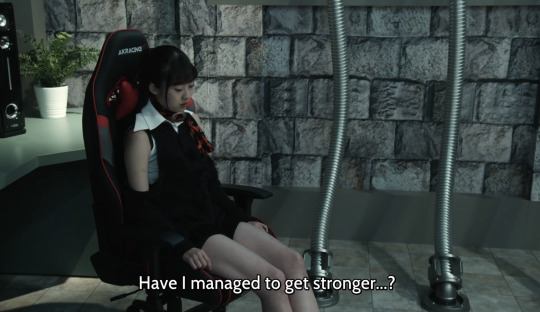
She stated this because both Ikki and Daiji have advanced to the next stage (Daiji can now combine with his demon too) — which means Sakura’s the last; and now—
The weakest (TM)
Ikki being the strongest is one thing. Man’s always excelled and since he raised Daiji and Sakura they see him at Superman Standard / basically like a god.
But Daiji? Weak Dai-Chan? The middle bro she has to protect?
Now he’s stronger than she is and Sakura can’t handle that. She can’t handle being the last of the three. The youngest. The weakest. The girl.
(Etc. Etc. Etc.)
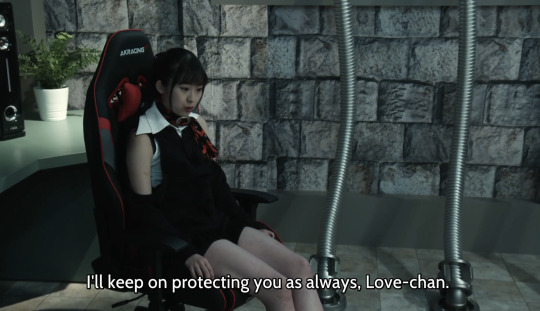
She states this because she’ll always protect her vulnerabilities, especially as an enneagram 8.
Being vulnerable is something she hates the most. She always wants to be seen as capable and strong. Reliable. (Yada yada yada)
Basically—
Sakura has embraced her vulnerabilities YES; but that doesn’t mean she’s accepted being vulnerable; which she isn’t a lot of the time.
And since things have been especially hard lately (thanks Dai-Chan <333), she’s feeling extra vulnerable. Which is why she’s questioning herself and her abilities, and also why Lovekov is injured
(metaphorically, of course 👀)
#more analysis and for what?#what am I doing kid reaction lmaoooo 🤡#kronthescoup#kamen rider revice#kr revice#revice#bath 45#ikki why is ur demon so cringe#sakura igarashi#revice meta#revice analysis
5 notes
·
View notes
Text
Thinking a LOT about Lucifer in the latest Hazbin episode. Idk what I was expecting but not this??
As I was watching my immediate thought was just "huh... Lucifer is kinda of weird..." but as the episode went on I realized the issue
the dude is off the chain depressed, like he says it as a joke but holy cow it is SO BAD
He's manically just creating rubber ducks cuz his daughter really like it that one time but it's empty, it's never good enough but he keeps doing it, maybe cuz he doesn't know how to pass the time otherwise.

like I get the feeling he HAS better things he SHOULD be doing than making rubber duck after rubber duck. At first I was like, "Bruh why isn't the king of hell doing anything?" aaaaand then it became clear...
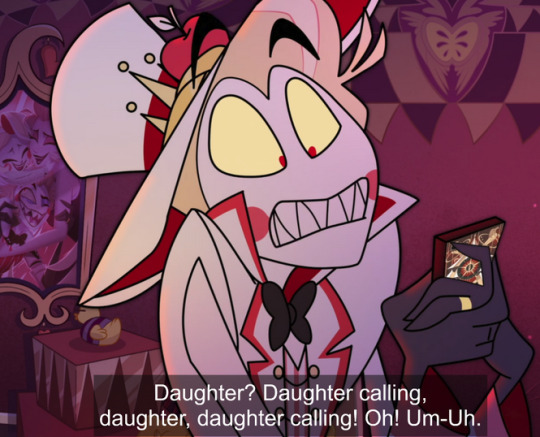
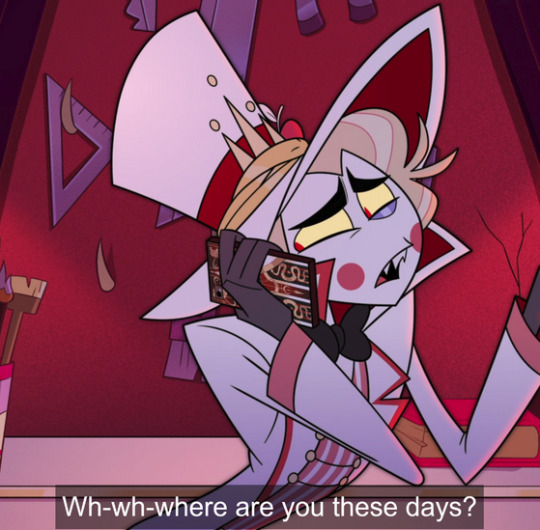

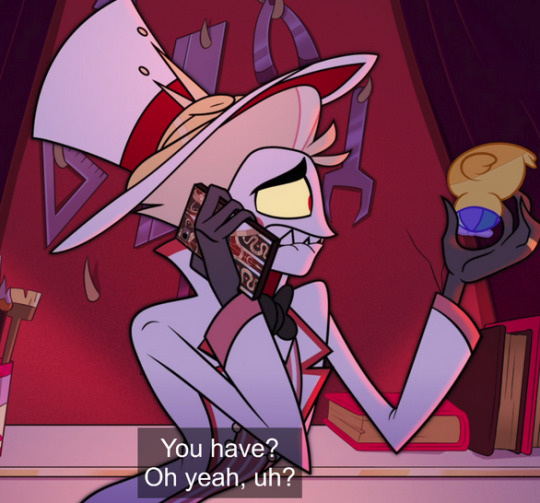
The dude is disassociating so bad he can barely hold a conversation let alone remember information. He clearly WANTS to, he wants to be involved with his daughter so bad, he wants to care about the things she's doing so bad, but his depression keeps interfering. It's like he can only hear every other word and he grasps onto the ones he does hear semi-out of context. Like you can see every time he catches something that he hadn't before and he just "well shit I didn't catch that part"
and that's why he reacts so weird when people talk to him. He is struggling so bad to engage with the conversation he's only getting 50% of it
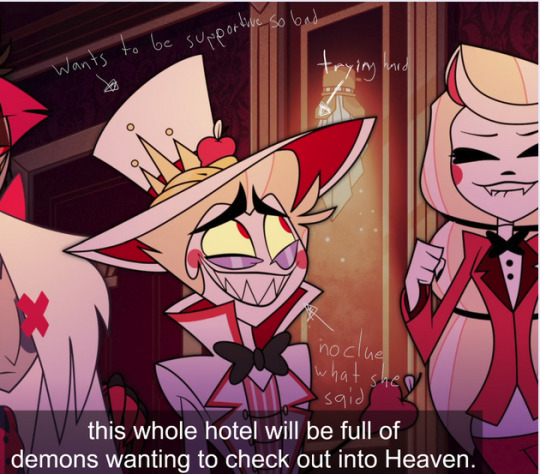
does that look like the face of a man who knows what the hell the conversation is even about??? he is STRUGGLING
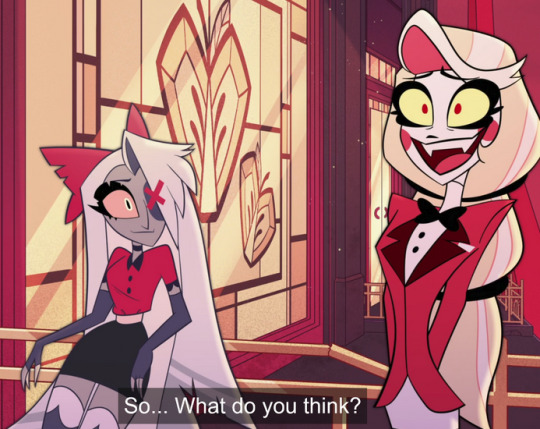

like Charlie spent so long telling him about the hotel, and he STILL didn't understand what she wanted. Yeah it comes off as ditzy but literally I've been in that position where your brain just "nope, not doing this right now" and nerfs your conversation comprehension. So as someone who's BEEN in that position, to me it feels exactly like what he's dealing with. He's sorta engaged with the conversation, but only as much as his brain will allow
For example, when I'm dealing with this, this is what someone talking to me feels like this where the crossed out parts are what I missed and bold is what I catch, "Hey! You know I was thinking for dinner we could either make some chicken with rice? But if you don't feel like cooking, pasta is super easy and you love that right? What do you want to do?" you can kinda get that someone is trying to talk to you about dinner, and towards the end you get the impression that they asked something that needs your input so you can decently put 2 and 2 together and try and pass off, but crucial bits were left out, I would have no idea that either chicken or pasta is in the conversation only having heard "rice". When someone is just talking at me, I can decently pass off as being engaged but the second I'm required to participate in the conversation I'm screwed. Seem familiar? At which point I have 2 options, try to give a bullshit answer, or admit that I missed what they were saying and ask them to repeat
Lucifer, unfortunately, is trying so damn hard to hide that he's dealing with like 24/7 dissociation, so he can't admit that he's missing entire chunks of the conversation, hence his really weird replies. He does eventually get the full picture and then he and Charlie start having the real conversation
Also, the Alastor/Lucifer rivalry was hilarious but also really indicative of more of what Lucifer is dealing with
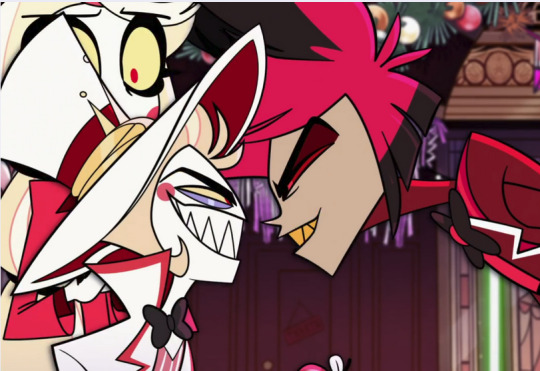
Alastor is, unfortunately, really good at picking up people's insecurities, and thanks to Charlie's description earlier and watching Lucifer clearly trying to overcompensate, he immediately picks up on the fact that Lucifer KNOWS he struggles to be a good dad (we know cuz it's cuz of the depression, hard to be engaged when your brain keeps turning off) and decides to rub salt in the wound by pretending he's been acting as a surrogate father to Charlie. Now why Alastor decided to pick a fight with the king of hell is beyond me, I do not understand Alastor (and I LIKE IT) (maybe it's cuz Alastor thinks he's hot shit and was expecting Lucifer to at least have heard of him but Lucifer just treats him like a nobody? who knows)(why would Lucifer listen to radio anyways when he can't even pay attention to a conversation it'd just be white noise)
But yeah I just was expecting someone who oozed either charisma or presence and instead I got a depressed dad who's dissociating so bad he can barely function and be present in his life. The only thing it seems he CAN do is make rubber ducks cuz his daughter really liked it that one time
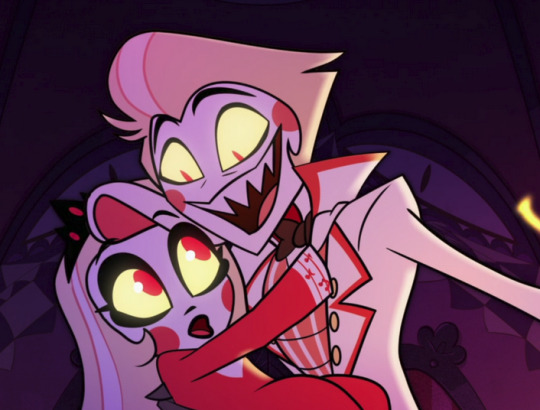
Idk Lucifer is tragic to me. Whatever the full details of what heavan did to him absolutely broke him and he can't deal with it. He's aware of it, and he doesn't know how to fix it, so he tries to over compensate and sorta makes an ass out of himself but no one says or does anything cuz this guy is supposed to be THE king of hell
Suddenly it's making a lot more sense why he just rolls over and lets heaven do what it wants and even told Charlie to go in his place the start of the show. He's not in any headspace to hold a basic conversation let alone negotiate! He didn't even know who Alastor was, he's been so out of touch
idk I like him, he seems sweet, I hope Charlie brings some light back into his life. He really needs to get out of that rubber duck room
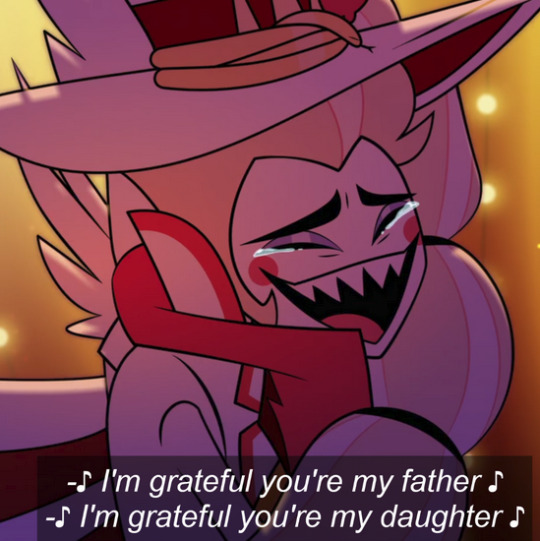
#hazbin spoilers#hazbin hotel#lucifer#lucifer morningstar#analysis#dissociation#look idk what to tell you all#I watched the episode and everything makes so much more sense#when you realize he's only intaking like 50-60% of the conversations#he's not bad at listening his brain is literally preventing him from getting everything#literally I've been there#the difference between him and me tho#is that he can't show it#he's the king of hell#he has to bluff his way through conversations#but yeah literally rewatch the episode with this in mind#and watch him reply to the things he DID catch#anyways#NEW BLORBO????#who'd've thought I would go into Hazbin Hotel#and come out with freaking LUCIFER as my favorite character#I love him#he's so sad
14K notes
·
View notes
Text
I think one of the biggest tragedies of Laios & Falin and their relationship is how much his actions impact her life. But like. Specifically how much they WOULDN’T impact her life as much if they weren’t both stuck in such a shitty abusive situation.
This part of the Falin-tries-makeup daydream hour comic is what got me thinking about it again because truly it just... it seems like such a like an offhand comment that I'm sure Laios didn't mean to be cruel or anything. That's just like. A little kid not thinking about what they are saying. ESPECIALLY when the kid in question is Laios.
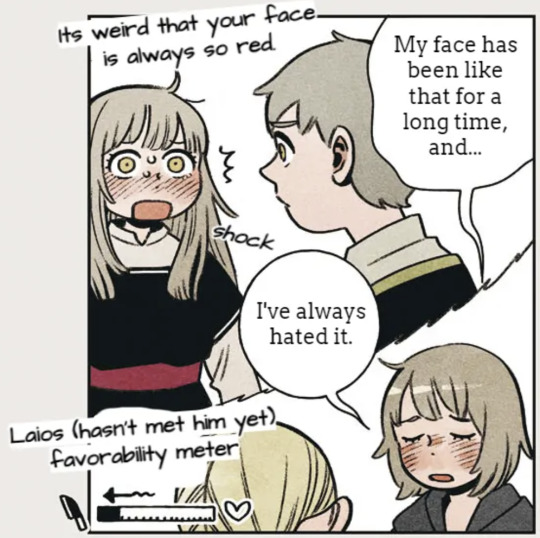
But man they depended on each other SO much as kids. Too much. It really feels like they didn't have any other source of positive reinforcement, or anyone else to share themselves with. So of course an offhand comment like that has a huge impact on Falin.
Or this little bit from one of the flashbacks:
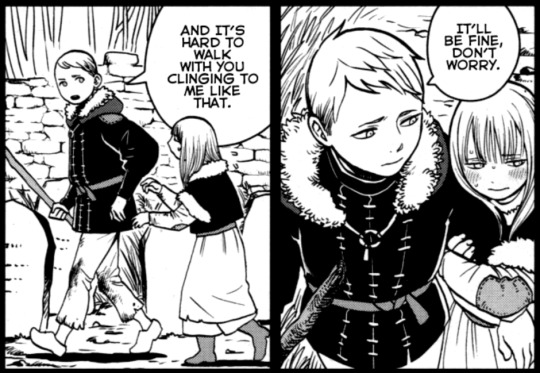
This tears me apart. Do you think it tears him apart to think about? I think it does. I think Laios holds every small failure to care for Falin against himself.
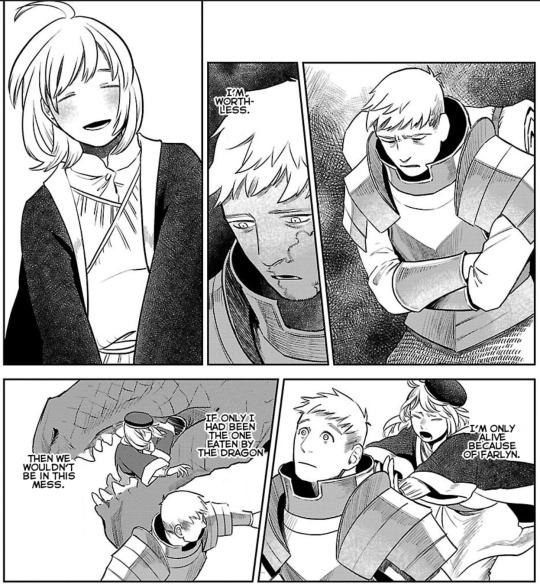
And then there's the Bigger stuff. The way that him coping with his own trauma ended up impacting her.
Like his interest in monsters. Like him going to find a ghost, and accidentally revealing Falin's magic to the whole village in the process.
Like him needing to leave. And leaving her behind.
He shaped her life so much, and he carries so much guilt for it. And again, there should have been other people there to help. The same things that made Laios need to leave home are the things that made his leaving so hard on Falin. She ate alone after that. She shouldn't have had to eat alone just because Laios wasn't there.
She was 9 when he left for school, and he was 11.
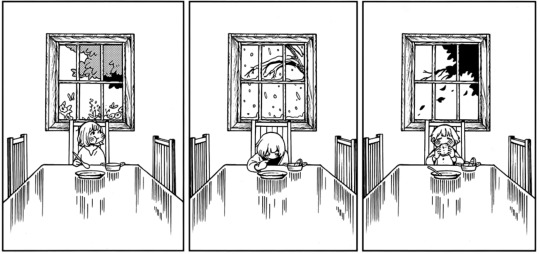
Nine. And Laios feels like he failed her because he didn't stand by her through this better. As an eleven year old.
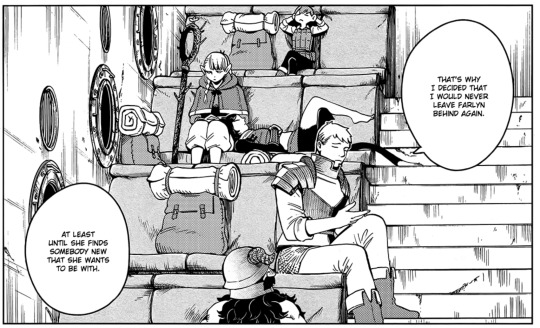
Both of these kids deserved so much better from the world.
#dunmeshi analysis#dungeon meshi#delicious in dungeon#falin touden#laios touden#dungeon meshi spoilers#AND this isn't even getting into her leaving the academy & how much it seems like that was directly tied to how poorly he was doing#there's a comic in the adventurer's bible where marcille is like 'yeah she had a job lined up and everything'#and like. do you think he feels bad for that too#like he wrecked her life by leaving#and wrecked her life by showing up#what do you even do at that point. if you feel like a failed protector when you are away & and a burden when you return#unable to make yourself accept. unable to make yourself resist#Laios strongest moment is when he lets himself accept that. the contradiction of his life & his relationship with Falin#that he has to kill her to save her#as a small note this came out a little more focused on Laios' POV with this stuff but Falin's experience of it is v important to me too#didn't mean to sideline her but her feelings about stuff are more speculative and probably need a post of their own
9K notes
·
View notes
Text
Learning that fans hated Applejack and called her "boring" is crazyyy to me because I genuinely, unironically believe AJ's the most complex character in the main six.
Backstory-wise, she was born into a family of famers/blue collar workers who helped found the town she lives in. She grew up a habitual liar until she had the bad habit traumatized outta her. She lost both her parents and was orphaned at a young age, having to step up as her baby sister's mother figure. She's the only person in the main gang who's experienced this level of loss and grief (A Royal Problem reveals that AJ dreams about memories of being held by her parents as a baby). She moved to Manhattan to live with her wealthy family members, only to realize she'll never fit in or be accepted, even amongst her own family. The earlier seasons imply she and her family had money problems too (In The Ticket Master, AJ wants to go to the gala to earn money to buy new farm equipment and afford hip surgery for her grandma).
Personality-wise, she's a total people-pleaser/steamroller (with an occasional savior complex) who places her self worth on her independence and usefulness for other people, causing her to become a complete workaholic. In Applebuck Season, AJ stops taking care of herself because of her obsessive responsibilities for others and becomes completely dysfunctional. In Apple Family Reunion, AJ has a tearful breakdown because in she thinks she dishonored her family and tarnished her reputation as a potential leader –– an expectation and anxiety that's directly tied to her deceased parents, as shown in the episode's ending scene. In The Last Roundup, AJ abandons her family and friends out of shame because believes she failed them by not earning 1st place in a rodeo competition. She completely spirals emotionally when she isn't able to fulfill her duties toward others. Her need to be the best manifests in intense pride and competitiveness when others challenge her. And when her pride's broken, she cowers and physically hides herself.
Moreover, it's strongly implied that AJ has a deep-seated anger. The comics explore her ranting outbursts more. EQG also obviously has AJ yelling at and insulting Rarity in a jealous fit just to hurt her feelings (with a line that I could write a whole dissection on). And I'm certain I read in a post somewhere that in a Gameloft event, AJ's negative traits are listed as anger.
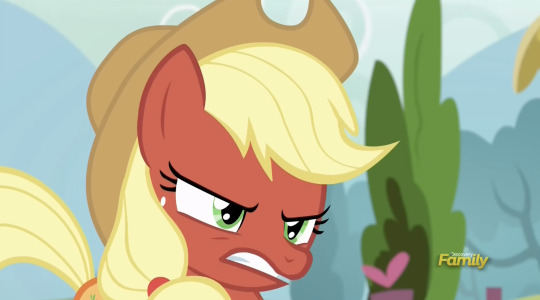
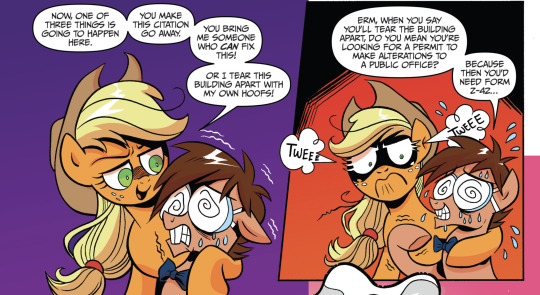
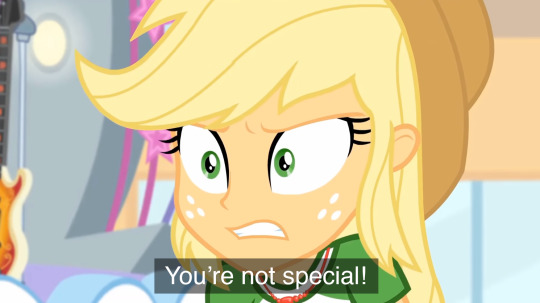
Subtextually, a lot of these flaws and anxieties can be (retroactively) linked to her parents' death, forcing her to grow up too quickly to become the adult/caregiver of the family (especially after her big brother becomes semiverbal). Notice how throughout the series, she's constantly acting as the "mom friend" of the group (despite everything, she manages to be the most emotionally mature of the bunch). Notice how AJ'll switch to a quieter, calmer tone when her friends are panicking and use soothing prompts and questions to talk them through their emotions/problems; something she'd definitely pick up while raising a child. Same with her stoicism and reluctance at crying or releasing emotions (something Pinkie explicitly points out). She also had a childhood relationship with Rara (which, if you were to give a queer reading, could easy be interpreted as her first 'aha' crush), who eventually left her life. (Interestingly enough, AJ also has an angry outburst with Rara for the same exact reasons as with EQG Rarity; jealous, upset that someone else is using and changing her). It's not hard to imagine an AJ with separation anxiety stemming from her mother and childhood friend/crush leaving. I'm also not above reading into AJ's relationship with her little sister (Y'all ever think about how AB never got to know her parents, even though she shares her father's colors and her mother's curly hair?).
AJ's stubbornness is a symptom of growing up too quickly as well. Who else to play with your baby sister when your brother goes nonverbal (not to discount Big Mac's role in raising AB)? Who else to wake up in the middle of the night to care for your crying baby sister when your grandma needs her rest? When you need to be 100% all the time for your family, you tend to become hard-stuck with a sense of moral superiority. You know what's best because you have to be your best because if you're aren't your best, then everything'll inevitably fall apart and it'll be your fault. And if you don't know what's best –– if you've been wrong the whole time –– that means you haven't been your best, which means you've failed the people who rely on you, which means you can't fulfill your role in the family/society, which makes you worthless . We've seen time and time again how this compulsive need to be right for the sake of others becomes self-destructive (Apple Family Reunion, Sound of Silence, all competitions against RD). We've seen in The Last Roundup how, when no longer at her best, AJ would rather remove herself from her community than confront them because she no longer feels of use to them.
But I guess it is kinda weird that AJ has "masculine" traits and isn't interested in men at all. It's totally justified that an aggressively straight, misogynistic male fandom would characterize her as a "boring background character." /s
At the time of writing this, it's 4:46AM.

#mlp#yeah i wrote this last night during insomnia.#yeah i know an embarrassing amount of crap about this kids show#but whatever it's my hyperfixation i'll store as much useless information as i want!!!#i'm gay and neurodivergent i have an excuse#in case you needed more proof that aj's my favorite character#personal#delete later#unless you like this analysis stuff#i get why they didn't reveal aj's parent's death until way later and why they didn't do much with it but i wish they did#cuz narratively there could've been so much material with aj's grief. like. i feel like we gloss over the fact that she lost her#mother and father as a teenager#i tried keeping my personal hcs out of this to keep it unbiased#but i'll put some in the tags#involving rarijack –– i think aj can be (but not always) very self-conscious about her relationship with rarity#anxieties that she's not the right fit or that rarity will move away and leave her some day or that another woman will take her attention#(like in rollercoaster of friendship?? nudge nudge??). basic seperation anxiety stuff#long post#regarding applebloom whenever i think about her and her parents i think about that scene in steven universe where steven looks up at#a portrait of his mother and openly wonders what kind of sack lunches she would've made for him. that episode still fucks me up
7K notes
·
View notes
Text
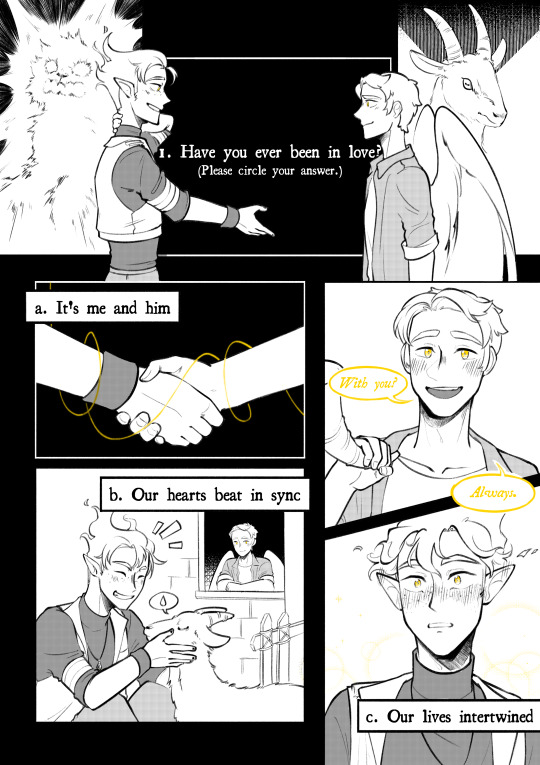
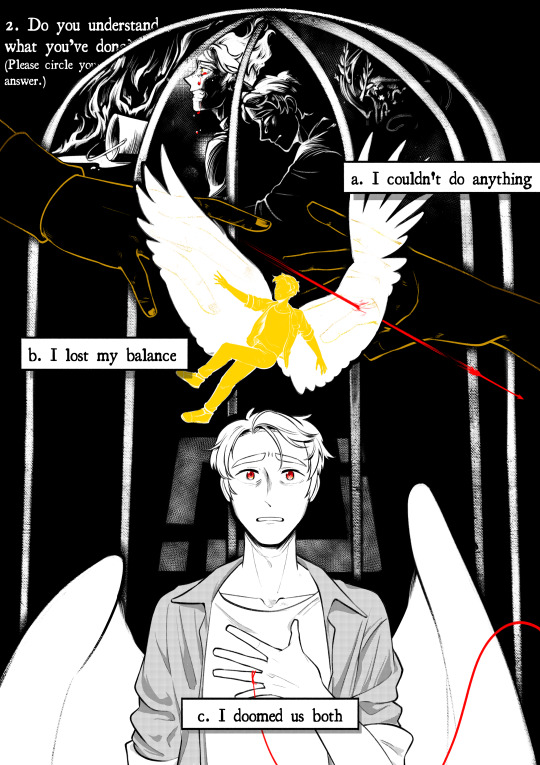

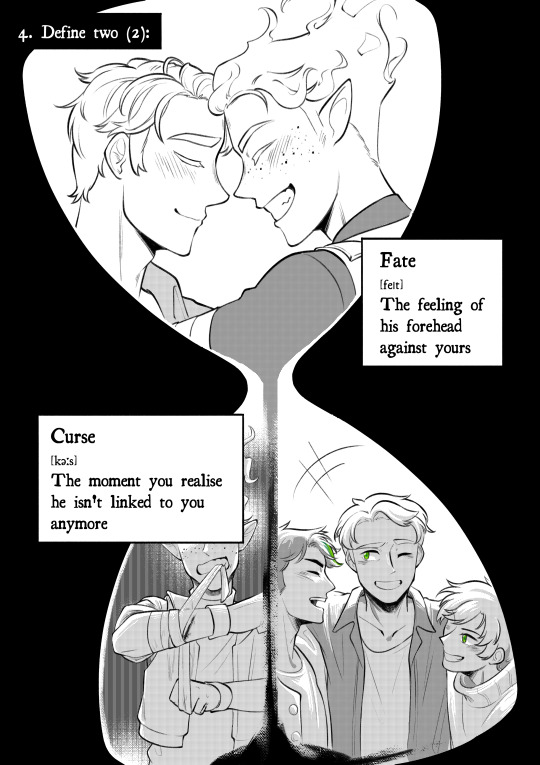
You have 90 minutes to complete. (original poem: r.a.)
In participation of the MCYT Recursive Exchange 2024 hosted by @mcytrecursive!
Inspired by know that all my love will be your breath (i will save you when your lights go out)
[text under cut]
1. Have you ever been in love?
(Please circle your answer.)
a. It's me and him
b. Our hearts beat in sync
c. Our lives intertwined
2. Do you understand what you’ve done?
(Please circle your answer.)
a. I couldn't do anything
b. I lost my balance
c. I doomed us both
3. It's been god knows how long since you felt phantom hands on your neck and there is no one in sight. If you were soul-bound to him and both of you died at the same time then why are you still waiting in the void?
Please answer clearly, in full sentences.
(Not a correct answer:I just wanted to see him one more time).
4. Define two (2):
Fate | The feeling of his forehead against yours
Curse | The moment you realise he isn't linked to you anymore
5. True or False:
i. It was your fault.
ii. You wish you had met him under different circumstances.
iii. You can’t regret a single moment that you had him.
iv. You would do it all over again if you could.
v. It ended long before either of you said anything.
thumbnails:

sketch cover thing for imgur link:

#team ranchers#team rancher#rancher duo#jimmy solidarity#tangotek#trafficshipping#mcyt recursive exchange#events#fic fanart#my art#“canary has butterfly-shaped wings it cant do a dramatic spread like that” watch me. (draws dramatic wings) (sorry)#“you have 90 minutes” have been rattling in my brain for so long ever since i suddenly remembering a web weave using it (yes the beeduo one#very glad i can release it (using it in art) from its confines (my mind)#hm i suppose the title would be more in theme if its abt limited life ranchers#← havnt watched limlife yet#but! happy with what i come up with. lil bit proud even#had so much trouble with the panelling and layers in p2 cause it looks too busy (explodes)#also punching the floor bc i only noticed the “yes-no” pair(?) in the original poem when im already half-done w/ the comic#me when making silly comic makes you do poem analysis#i dont even go there ← does not have enough poetic braincells
3K notes
·
View notes
Text
Wait a minute. Wait a minute. This line hits differently after S2.

You two?
The Antichrist KNOWS ALL ABOUT THEM?
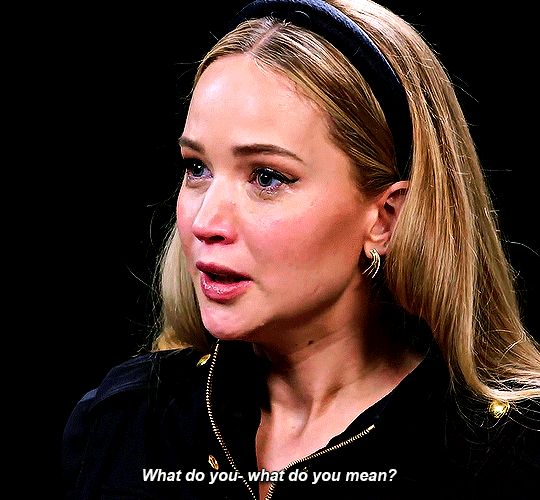
What did he do for them that he told them so confidently not to worry about their future? What did he change while he was in God Mode editing reality? WHAT DID ADAM DO?
#the antichrist knows the angel and demon are in love#Adam Young ships AziraCrow#so what if I'm writing too many fics at once THERE IS ROOM FOR ONE MORE#good omens#good omens meta#good omens fandom#good omens analysis#ineffable husbands#ineffable partners#aziraphale#crowley#adam young#aziracrow
4K notes
·
View notes
Text
Ok guess talking about A New Wish again cus I got invested lol
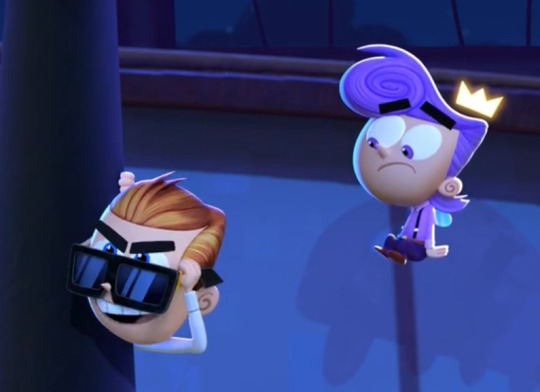
Anyways maybe it’s a me thing (it’s definitely a me thing) but, I do get a little sad when ppl act like Peri doesn’t care about or straight up hates Dev. I’ve seen a few rbs and tweets it’s not a lot but, it did make me think about this. See I actually got the opposite impression of what we’ve seen of the dynamic. Peri cares a bunch for the kid and Dev doesn’t dislike him just still struggling to trust him. We’ve seen him take awhile to trust ppl and let his mask down for Hazel. She also seems to be the only one who got to him so far.
So Peri is going through what a lot of parents do, ending up with a kid they weren’t prepared for. Bro seems mostly tired. If anything I feel if Peri was to be mad at anyone it not be Dev, it be the fairy department who assigned him a very obviously tougher case that a newbie as himself wasn’t equipped to handle. Dev by no means is a bad kid but, he’s more complicated compared to his god kid counterpart in Hazel. She definitely has her own issues (hence why Cosmo and Wanda wanted to help her) but, she’s more well adjusted than what’s going on with lil Dimmadome over there.
I’ve seen someone mentioned Peri was screwed over by the Fairy Department here which I 100% agree with. In fact I’ll go a step further and say they both were. Just like Peri should have been given a kid who he could more reasonably handle Dev should have gotten a gotten a fairy that had more experience so they could properly handle his issues. Yet despite all this I actually like that they were paired up this way.
It was a unfair yes but, also really irrelevant thinking about this. Cus given how the episodes been going so far I definitely see these two having an arc about Peri learning to appreciate his parents while letting them know he’s his own man now. While Dev is gonna learn to continue to open himself up to others. Eventually growing to trust Peri and see him as a dad. You given who his actual dad is like.
I take these two so seriously guys. I don’t think I’ve seen a fairy and god kid relationship like this. Most of them are usually at least got along relatively well. Honestly no not here. Peri and Dev pair up feels like it is set up to fail yet the idea they still in the end up making it work and get to see each other eye to eye is great. I have a strong feeling that where this is heading.
I’ll give them a bit and they’ll be like the sweetest adopted father and gay son dynamic. 💞
Edit: Wtf where all these notes coming from? I’m at least glad to see ppl agree with me here. I’m beyond happy he got Peri btw. Even if in universe it probably was a mess up or The Fairy Department fucking shit up lol
#fairy odd parents#fairly oddparents a new wish#a new wish#fop a new wish#fop#fop peri#fop poof#fop dev#dev dimmadome#story prediction#character analysis#sorry I’m probably using the wrong tags lol#idk what tags are used more for this series
566 notes
·
View notes
Text
in the nicest and most non-confrontational way possible. i feel like some of you think that anything that isn't directly openly spelled out for you within a story is "missed potential" or "unexplored." like. sometimes there are implied narratives. sometimes the point is that you as the reader are supposed to think and draw your own conclusions and participate in the story. the writers not directly spelling every little detail out for you doesn't mean that the story is poorly written or missed its own plot details somehow. PLEASE.
#if i get one more comment referring to zelda's draconification as wasted potential im going to lose it for real#that's not unexplored potential that is THE ENTIRE STORY. JUST BECAUSE THEY DONT BEAT YOU OVER THE HEAD WITH IT DOESNT MEAN ITS NOT THERE#i get this all the time with just like. link's trauma in general too.#like people will ask me 'do you think they should explore link's trauma more' and im like. they do#that's what the games are about. it's all there. they just don't directly state that that's what they're doing because theyre expecting you#as a reader to ENGAGE WITH THE DAMN TEXT BEYOND SURFACE LEVEL. UGHHHHHHH#WHATEVER. whatever#like i feel like some of you would read the great gatsby and be like#'there was a lot of missed potential to talk about the failure of the american dream' GIRL IT'S RIGHT THERE. JUST THINK A LITTLE#personal#and yeah obviously its not that deep its a video game but like. i am not making shit up when i write my comics and analysis.#I AM ENGAGING WITH THE TEXT. AS IS GENERALLY EXPECTED OF A READER#ugh ok whatever. im done now sorry
658 notes
·
View notes
Text
Something I was always a little concerned about in the lead-up to Hazbin Hotel was that Charlie was going to be a bit too passive of a character, ie; leaning only into the ‘kind, optimistic Disney-Princess-in-Hell who just wants to help everyone’ vibe and not really have much else going on as a character. Which in turn would make her feel kind of bland next to the big, over-the-top or dramatic personalities like Angel Dust and Alastor.
But thankfully, that is not what happened and there’s actually a lot that I like about what the writers are doing with Charlie, particularly in the potential future development and reveals they seem to be setting up.
First off, I like how Charlie generally comes off more like an over-the-top caricature of that ‘Disney-Princess-in-Hell’ vibe, ie; SUPER energized, enthusiastic, affectionate and emotional, often to overbearing degrees that get on everyone’s nerves. It’s generally funny, or at least amusing, and lets Charlie stand out alongside the other big personalities in the cast. Funny enough, she’s actually a lot like Blitzo in this regard, minus the seesawing into extreme abrasiveness.
And more importantly, we’ve already gotten major hints all but confirming that this over-the-top personality is largely a façade, and that Charlie actually has some very clear issues and baggage that she’s working VERY hard to keep buried beneath the surface. Again, much like Blitzo.
Like how in the trust-fall exercise in episode three, despite asking everyone to reveal something personal, Charlie actually bullshits just as hard as Angel Dust and Sir Pentious with her whole ‘I love you all!’ bit. Sure, it’s not like she was lying or being insincere, but it’s clear that was NOT something truly personal for Charlie. And in episode 4 we have Husk straight-up calls out Charlie as ‘wanting to solve everyone’s problems but her own’.
Then of course we have the brief glimpses we’ve seen of Charlie getting angry. Both the times we’ve seen Charlie dealing with some truly despicable and horrendous characters, we’ve seen that rather than lacking the ability to get angry, Charlie is often working to hold herself back. In both her encounters with Adam and Valentino we see points where Charlie is clearly NOT intimidated or afraid of them at all and seems fully prepared to throw down, only being stopped by reigning herself in or by someone else (in this case Angel) stopping her.
Again, it all paints Charlie’s big, bubbly, hyperactive exuberance as something of a front, a way for her to bury a lot of thoughts, feelings and general baggage she doesn’t want to face. Just like what the show has already explored with Angel and Husk.
It actually raises some interesting questions as to what’s REALLY driving Charlie in running the hotel and trying to help Sinners. For one, Husk has already pegged Charlie as ‘wanting to solve everyone’s problems but her own’. And going back to thematic crossover with Helluva Boss, I can’t help but see some potential parallels between Charlie creating the Hazbin Hotel, and Blitzo creating Immediate Murder Professionals.
I think it’s pretty clear at this point that half the reason for creating I.M.P. was as a coping mechanism for Blitzo, or rather the assassination business in general. Something that we’ve gotten hints to as early as the second episode in Blitzo’s back and forth with the Robo-Fizz (“Does anyone love you, Blitzo?”/“No. But I’m really good with guns now!”). With the other half of the reason Blitzo created I.M.P. clearly seems to be to create a surrogate family, as seen with how much he tries to insert himself in the M&M’s lives. Possibly even a specific attempt to replace the family he unwittingly destroyed fifteen years ago.
So I really have to wonder if we’re going to find out that Charlie creating the hotel and her goal of redeeming sinners is in part likewise a coping mechanism and escape for her own baggage.
It’s actually really interesting how episode two first introduced the idea of people opening up with Sir Pentious, then episode four dived further into the concept of the walls and fake personas people put up to hide from their pain and trauma with Angel Dust and Husk. With those two opening up and starting to let their walls down to each other, and by extension we the audience, I think it makes Charlie’s own façade all the more noticeable. It’ll be pretty interesting if Charlie actually winds up being the toughest nut to crack when it comes to opening up about their real issues and baggage. Yet another interesting trait she shares with Blitzo.
All in all, I’m really liking what the show has been doing with Charlie as a protagonist. And I’m REALLY interested to see where the story is going to take her.
Particularly what’s going to happen when she reaches a breaking point…
#hazbin hotel#helluva boss#hazbin analysis#hazbin theory#charlie morningstar#helluva blitzo#character parallels#character analysis#charlie has a LOT more going on than she's showing#blitzo hitting his breaking point had him crying himself to sleep into a pillow#what if charlie hitting HER breaking point has her raining LITERAL ARMAGEDDON down on some poor bastards?
839 notes
·
View notes
Text
Ideology of Exceptionalism and Gravity Falls; meta and character analysis

I had a whole ago read a post by @icanlife that had a quote by Alex Hirsch on Ford's greatest flaw, and wanted to explore what the flaw is, which is the ideology of exceptionalism; in the exploration, I’ll touch on what it is and how it is used in abusive relationships and cults, as well as how it drives multiple Gravity Falls characters and consequently how it impacts relationships between these characters, and how the show ultimately refutes exceptionalism.
Quick note here; I am not in any way, shape or form a psychologist nor have any formal training in psychology; this is written from my own experiences with this ideology and my own forays into psychology and trauma-informed learning. It is also written with a loose understanding that is likely not broad enough to cover all references to cults, extremist groups and abusive relationships.
The Ideology of Exceptionalism
First of all, we have to get through a drier bit, which is… what is the ideology of exceptionalism and how does it arise? Might be fairly obvious, but it is the belief that you are, or belong to, a group of exceptional people, thus more important and worth more than anyone else; ie, those who don't qualify as 'exceptional'. It is often a subconsciously learned ideology. Now, what qualifies one as exceptional can be extremely varied; generally it revolves around something that provides some form of privilege. Thus, it might be, as the main exceptionalist idea in Gravity Falls, 'intelligence', or power, or it can be such things as attractiveness, quantity of money one has, species, nationality, or skin colour and ancestral heritage. The ideology of exceptionalism, being by nature hierarchical, devalues, and at its worst, openly and violently dehumanizes those who do not qualify as exceptional.
For why exceptionalism occurs is an extremely broad topic, but I've personally found that, for exceptionalism revolving around intelligence, it's a result of a poor sense of self-worth, and having one's self-worth tied to what makes one exceptional. Poor self-worth itself (again, broadly) is a result of childhood trauma from a lack of positive affirmation and unfulfillment of the emotional needs of the child. Meanwhile, self-worth becoming tied to the quality of exceptionalism generally is a result of when positive affirmation was pretty much solely provided around their 'exceptionalism', especially when provided derogatory commentary, or a blatant example of how they would be treated if they aren't 'exceptional'. As a result of the general lack of affirmation, self-worth then becomes often solely reliant on the qualities of exceptionalism, as that is the only way for the child (and later, adult) to get affirmation of their worth, as well as out of fear of being ‘not worth anything’ like the examples of ‘non-exceptional’ people they have been given.
This is especially likely to occur when the child is a social outcast; the adoption of the hierarchical ideology of exceptionalism, and the devaluation/dehumanization of others often occurs subconsciously as an avoidance/minimization tactic from pain. This is to say, the child, and later the adult (if healthy self-worth is not established) goes 'it doesn't matter what the non-exceptional people say or if they accept me since I matter more than them because of my exceptionality'. It can even be taken further, that being shunned is part of one's exceptionalism, and becomes part of the qualifier of being exceptional. For instance, 'they just can't understand because they aren't exceptional and that's just a part of being exceptional'. This idea also neatly tailors into the part of the concept of being better then others means you are separate from others; this can be taken that someone who is special, needs to be alone to be truly special.
Obviously, exceptionalism is not a healthy coping mechanism for poor self-worth, as often such people constantly feel the need to prove and show off their exceptionalism to gain that affirmation and avoid rejection, which is stressful. As well, it often negatively impacts their relationships with other people as a result of the arrogance of believing that they are better than most others, or even deliberate sabotage due to their arrogance. This occurs as they flatten the complexity of human experience to black-and-white hierarchical categories of exceptional/not-exceptional through constant judgement of those they meet, and often refuse to engage with people who don't belong to their 'exceptionality', or even people they simply don't like, even if they technically qualify. Generally, those that they do like or have close relationships with, often due to being similar, are automatically labelled as 'exceptional'. Those judged as ‘exceptional’ also become privy to the open judgements of ‘non-exceptional’ others, out of a subconscious belief by the exceptionalist that the other believes similarly; something that may strain their relationship if the other doesn’t ascribe to exceptionalism. This all culminates in the exceptionalist being blind or even adverse to the diversity of experiences, which makes it difficult to create relationships and community outside of echo chambers of their own beliefs (if they can even find this), and subsequently, these people are often isolated and have very few to no close relationships with people.
However, all humans require connections with other people, relationships where one can rely on others emotionally and physically if needed and feel accepted; they also require to feel like they are worth something, that their life has meaning. Lacking meaningful connections and having a crippled sense of self-worth, a deep yearning hole is left in these people. Exceptionalism, especially as it is a narrative constantly pushed by Western society as it validates hierarchies, is then employed as a (often subconscious) trauma response to assuage this yearning hole, with arrogance and denial. And depending on the circumstances, it can be a very strong and definitive trauma response for people.
This isolation and lack of self-worth is catnip to abusive relationships, including cults and extremist groups. These types of relationships often heavily rely on isolating their victims or pulling them into echo chambers of solely the abuser’s rhetoric, to redefine what is healthy through gaslighting; as the exceptionalists are already isolated, this makes them extremely susceptible. They also often provide these people affirmation, and in these cases especially about their exceptionalism, thus confirming their self-worth, their 'specialness', while also providing them the connection they have been lacking, either through the cult community or through the abuser’s own presence. These emotional needs, which haven’t been met in a long time, if ever, begin to be fulfilled; something that abusive relationships and cults hinge on, rather than any form of logic.
Ideology of Exceptionalism and Gravity Falls
The main characters within Gravity Falls which are heavily ascribed to exceptionalism would be both Ford and Bill; this characterization deeply impacts the story and their relationships with others (technically the Northwest are another case regarding wealth, but less directly impact the storyline and thus tangential; Gideon also is an example, but as a mirror of Bill). With each of these characters I’ll go into detail within their sections on the way they began to ascribe to exceptionalism, and how it plays out later in their relationships; I will first begin with Ford, then move to Bill. Then, to cap it off, I’ll go into the characterization of Stan and the way Gravity Falls refutes exceptionalism.
Ford and Exceptionalism
Firstly, the quote from Alex Hirsch that kicked this whole baby off, as mentioned previously;
“Ford sees Dipper as someone who’s special like himself. That’s Ford’s great flaw, his arrogance is he believes that there’s special people, and everyone else. That human attachments are actually weaknesses. And the song and dance that he’s giving Dipper right now, is the song and dance that he gave McGucket, back when they were younger… ‘You and me are different, we’re better than everyone else. We have a path that no one else can understand, and only us can do this.’ It’s a very seductive idea for Dipper… Dipper is a smart kid, but Ford’s projecting. Ford loves Dipper because he sees someone who’ll tell him ‘yes’ to everything. Who’ll never challenge him, who’ll do a really insane dangerous mission.”
Very blatantly Alex Hirsch calls Ford out on his arrogance in the belief that he is special, in his belief in the 'lone hero' complex, in his belief in exceptionalism. And really, it should be no surprise that Ford does so, considering the way he's depicted as a social outcast as a child (other than Stan), and the way his parents have been clearly shown to be not particularly emotionally supportive (“I’m not impressed”); they don't provide positive affirmation except for his intelligence (mostly due to the possibility of money making through it…), while also actively comparing him to Stan who is derogatorily ‘not-exceptional’, and ‘worth less’. This all sets Ford’s self-worth up to be fragile, and other than Stan who wholeheartedly accepts him, he is isolated and invalidated; plus, the only other validation he receives is around his intelligence. All very classically fitting the profile for exceptionalism.

Image id: Stand and Ford when they were children, both clearly enjoying each other's company.
Ford’s belief in his exceptionalism catalyzes after the shattering of his and Stan’s relationship. Previously the twins are shown to do everything together, having a very close caring relationship; something unlikely if Ford thought he was better than Stan. Also, when Ford is talked to about his opportunities, Ford looks uncomfortable at the way they talk about Stan as inferior, compared to how he himself is being praised; but in the offer he’s simultaneously finally being validated, he’s being told he’s someone worth something, and he’s going to be someone worth something after this. And then the science fair incident occurs, and Ford loses that validation from his parents, from the judges and a future of more validation; after being promised validation and acceptance, it slips through his fingers. And in his anger of being denied that, it becomes easy to begin to slip subconsciously into the rhetoric the others have been feeding him; that he’s exceptional, that Stan isn’t, and he deserved to be recognized for his worth. So he breaks the relationship with the only person who accepted and validated him for who he is. With that loss of previous support, Ford becomes then deeply obsessed with proving his exceptionalism to the world to assuage that fragile self-worth, to become accepted, or even better, revered, confirming that he is someone of worth, someone special, like he was promised.
Ford’s obsession also doubly functions as a way to alleviate his guilt over shattering their relationship; if he’s exceptional as he believes, then he’s within the right to respond the way he did, as he’s worth more than Stan, he's better off alone, and he has a right to be angry over being denied that validation. As well, in much the same way as it is used as a way to alleviate his guilt over the end of their relationship, it is also likely used in a way to minimize the pain of being ostracized (although not directly depicted); afterall, Ford’s keenly aware and insecure about his social ineptitude and his six fingers as things that make him different from other people, case in point with his experience visiting Lazy Susans Diner. Thus it wouldn’t be unsurprising if he uses the idea of being worth more than those who ostracize him to imply it ‘doesn’t matter’ what they think. His ostracization by nature keeps him from generally forming close relationships, with the exception of Fiddleford (who much like him, is socially outcast, and intelligent) during his university days. As a result, he's isolated and acutely lonely, having lost Stan.

Image id: One of the missing Journal 3 pages in TBOB, detailing Ford's botched social interaction in Lazy Susans Diner. In the background is the print of his six-fingered hand.
In his obsession over being acknowledged, Ford, like many others who believe in exceptionalism, identifies strongly with the causes of his ostracization (his intelligence, his six-fingeredness) as part of, or wholly, makes him exceptional. It is obvious through his choice of study; with the grant he has been gifted, he chooses to revolve his work around the weird, the outcast, something that you see Ford gravitate towards being an outcast and deemed 'weird' himself (which in Journal 3 he openly talks about). Something that can be, much like him, framed as 'exceptional'. His work is even recorded in a journal that Ford deliberately chooses to put his six-fingered hand on the cover of. Intertwined with the way it becomes adopted into the idea of exceptionalism, is the keen loneliness from his ostracization and a deep desire to be accepted and a wish to find a community of other weird people.

Image id: Two pages from journal 3, labelled 'Myself', in which Ford is open about being weird, and a social outcast, while also noting his ambitions and that 'Gravity Falls, [is] the place that I fit in.'
Ford and Bill
All of this culminates in Ford becoming an incredibly easy target to manipulate by Bill. He’s desperate to be acknowledged (and thus accepted) by an authority figure so that his belief in exceptionalism is justified and his self-worth confirmed. And he knows he’s intelligent, that he's exceptional because people have told him so, but he just needs to prove it with something that shakes the world. And the grant is finally his second chance after the fair, but he's stuck, and the research is going nowhere, and he's in a town where he doesn't really know anyone and he’s so terribly lonely. And sure, he clings to his exceptionalism but if he can't even prove it then is he really exceptional? Is he even worth anything like he thought he was? And what about what he's left behind, rejected, because of his exceptionalism?
And THEN he finds an incantation and he ignores the warnings because maybe, just maybe, this will be his break to get that acceptance/validation he has been chasing his whole life?
And then it's better than that.
A god, essentially, shows himself to him, an ultimate figure of authority. And he tells him that yes, he is special, he’s worth more than other people, and Bill’s only showing himself to Ford because he is so much more intelligent than anyone else. Ford is suddenly getting his exceptionalism confirmed by a god of ancient knowledge, an immensely intelligent interdimensional being, and he’s also showering him with affirmations, specifically affirmations around what Ford's fragile self-worth is based on. And even better, he's delighted by Ford's six-fingeredness; he's not put off at all, it even becomes his main nickname for Ford, just like it used to be for Stan all those years ago. On top of it all, Ford's own social ineptitude doesn't phase Bill, another thing Ford is self-conscious about; Bill's own social ineptitude as he's not human probably makes Ford feel comfortable, knowing that's not expected from him.
Through Bill, not only does Ford find someone who validates his self-worth through intelligence and even confirms to him that his weirdness is part and parcel of making him special, he also finds someone who he regularly (generally) is in contact with, who enjoys talking to him and even banters with him familiarly. Hell, Bill even deliberately goes out of his way (literally possessing a whole wack ton of rats, then dream karaoke) to celebrate his birthday with him; how long do you think Ford has simply skipped his birthday since he had no one to really celebrate it with? The loneliness, beneath his arrogance and belief in exceptionalism, is being fulfilled; for the first time since Ford was a teenager, he's fully accepted by someone, social awkwardness, six fingers, exceptionalism and all.

Image id: One of the lost pages from Journal 3 in TBOB, the 'one thing led to another' page, with Bill and Ford singing karaoke and drinking together, both clearly enjoying themselves; Bill has an arm slung around Ford's shoulders.
So it's really no surprise at all that Ford fell for this, hook line and sinker. Hell, if I was in Ford's shoes I would fall for it just as hard. And I've seen a few posts floating around talking about how Bill is bad at manipulating, and no, he's not. He was able to pinpoint exactly what Ford wanted and needed, and provided that, was charismatic enough to provide that. Again, manipulation isn't about logic. It really isn't; it's about the emotional core in people, what people lack and what you can give them to slowly reel them in to sing your dance and song. And people will ignore vast swaths of red flags when you're finally being accepted, when you're finally getting your emotional needs met at least in some way or form. It's better than not having them met at all, such as previously. So Ford worshipping Bill is really not a surprise, especially as Bill deliberately stoked it.
All of this is part of why you see Alex Hirsch call Ford's belief in his exceptionalism his greatest flaw; because it allowed him to be very easily manipulated by Bill, and by its nature kept Ford isolated from others, evident by his arrogance in assuming he knows best and refusing to see other people who aren't as 'intelligent/weird' as him as worth getting to know, listen too and even reach out to ask help from, it's him believing he has to be the lone hero as someone whose 'special'. It's something that blinds him to the danger of his work around the weirdness of gravity falls because he’s desperate to seek a place where he and his weirdness belong, and it's something that plays out in each and every relationship he has because it's something he clings to so deeply. It's what cost him his relationship with Stan, who previously accepted him completely, and, as he's disinclined to form new relationships and as Bill actively strokes his paranoia (Trust No One…), ultimately further increases the hold Bill has over him. It's only Fiddleford’s presence as he works with Ford that allows him some form of outside reference and reprieve from solely Bill’s influence, something that Bill resents deeply and is clearly jealous and angry about, even if Fiddleford is helping create the portal. And it's ultimately Fiddleford, once he was aware enough of what was happening, calls Ford out on it, seriously jeopardizing Bill's influence over Ford; but Ford is too invested in the portal, in chasing his own ambition and caught up in Bill’s manipulation to take him seriously, until the incident with the trial, and Ford beginning to hear other voices then Bill.
Ford’s Exceptionalism and Wider Relationships
Now back to how it plays out in all Ford's relationships; we've already gone over it with Bill's influence, because it made him extremely easy to manipulate, and with his disregard of Stan in favor of validation of his exceptionalism. But Ford, as pointed out by Alex Hirsch, also exerts the ideology's seductive rhetoric to both Fiddleford and Dipper (who look up to Ford) in a similar way that Bill does with him (although there is a difference of it being used intentionally and maliciously, compared to subconsciously and earnestly, even if it is problematic). Ford, with his black-and-white view of exceptionalism, sees both Fiddleford and Dipper as people who are like him; 'exceptional', and so he treats them as such, and uses this rhetoric to coerce them into helping him.
For Fiddleford, the lure is how he can change the world, how he can be finally acknowledged if he helps Ford with the portal. And it works well; he willingly chooses to leave his own work and his wife and young son, to work with Ford. Much like Ford, Fiddleford himself is also a social outcast and regularly presumed less smart than he is, and he’s got a chip on his shoulder to prove himself, to gain acknowledgement and recognition from the world at large. Although Fiddleford has a family which presumes he’s not entirely lonely like Ford is, he also clearly has deep feelings for Ford, some which are hinted to be more than just ‘friendly’ feelings; it is likely the combination of the lure of validation and spending time with Ford, a kindred spirit that accepts him and an old friend/crush, that causes him to agree (afterall, it was Ford who made Fiddleford feel accepted and choose to stay at Backupsmore). And Fiddleford’s not even considered a partner, but rather an assistant to Ford due to Ford's arrogance, and he still drops everything to go! It’s more about their relationship and connection rather than validation, but that doesn’t stop Ford from espousing exceptionalism. And this is a distinguishing difference, because although Fiddleford would like recognition, he’s not there solely because of it; he’s not a believer in exceptionalism nor arrogant about his skills, and so, unlike Ford who is blinded by his obsession, he’s much more aware of the dangers of the weirdness of Gravity Falls. Thus, he's actively calculating the risks involved, and when he realizes there could be potentially devastating consequences of the portal, he attempts to talk Ford out of it; this fails due to Ford’s own denial and obsession over the portal. In the end, it all goes terribly sideways, and Fiddleford ends up losing everything he had; his wife, his son, his friend, his memories and himself to the trauma he had experienced at the invitation of his friend with the lure of validation and company, due to the memory gun he had created himself.
As for Dipper, much like Ford, he also has issues with self-worth (many of the episodes deal with Dipper finding self-worth; ie, the manotaur episode), has a physical oddity (his birthmark) and by far the trait he relies on most for worth is his intelligence (for example, in one episode he rubs it into Mabel's face over and over again in beating her in games). He's also extremely desperate to be recognized by authority figures as someone intelligent, case in point when he summons the dead after being made fun of by the government agents to try and show them that the information he's gathered is important after Stan dismisses his knowledge. This desperation to be seen as someone of worth from Dipper, much like Ford, extends to the need to be a hero, something he even says at the end of the zombie episode; yet, due to Mabel, unlike Ford he's not a lone hero, and Mabel also half the time acts as the hero.

Image id: Zombies crawling out of a crack after Dipper summons them; Dipper and the two agents look on in horror.
It all culminates in Dipper hero-worshipping Ford when he returns; really, no different than Ford worshipping Bill. And Ford clearly finds it extremely flattering; Dipper's attention and amazement of him feeds his exceptionalism. Exactly how Ford responded to Bill, Dipper is willing to do anything for Ford, excited too, in an attempt to impress Ford and be validated and accepted. And for Ford, that's an extremely heady feeling, especially as someone who has been constantly alone the last 30 years, especially when he had one previously confirm his exceptionalism all those years ago and stopped, and now someone is once again affirming that idea. And Ford doesn't have to be alone again, because he's found a kindred spirit in Dipper as his assistant, someone ‘just’ like him, someone who is exceptional. Because he sees himself in Dipper, he begins to espouse exceptionalism unconsciously, by praising Dipper's own intellect and adventurous spirit, assuaging his feeling of self-worth, while also telling him he's more important or better than others because of it.
And it's seductive to Dipper, because he wants to hear those affirmations of his self-worth, especially as he hero-worships him, but Dipper isn't sold on it, because it means leaving Mabel behind, it means believing that he's worth more than Mabel (and also, Stan, and all his friends he’s made in Gravity Falls). It's ultimately because of his relationship with Mabel that he rejects the ideology; he's not isolated the way Ford was with Bill, and he's not willing to break that relationship for that acknowledgement, because his relationships matter more to him.
Bill and Exceptionalism
Now of course, that's only on the Pines; what about Bill?
While it's obvious that Bill uses exceptionalism as a main manipulative tactic, it's not just an ideology he sprouts emptily; it's also an ideology he believes in, just like Ford, although it's less based on intellectual exceptionalism, and more on power and 'weirdness'.
This most distinctly can be seen in Bill's denial about what happened to his home dimension; Bill's belief in his exceptionalism occurs as a pain avoidance tactic from killing his whole dimension. Bill was clearly a social outcast within his dimension due to being able to see 3d; he's not accepted, and not trusted, to the point that there is medical intervention to make him blind. That's a deeply traumatic experience that completely erases one sense of self-worth, where one’s sanity is called into question by your parents on something that is not harmful, that's beautiful and you just want to share with them. It's a deep and clear rejection of who Bill is, and his ability. As a result, out of a desperate bid to be understood and accepted, he ends up trying to show them the stars. And it ends up killing everyone.

Image id: Page of TBOB, on 'The Early Years' which notes that Bill was an oddity for seeing 3d, something that was illegal to speak about. Bill frames it as something that made him 'special' and better than all the others.
Traumatized, and originally rejected by the dimension, he instead weaves an excuse of exceptionalism; that it doesn't matter what he did to them because he's exceptional and he's worth more than all of them because he can see 3d, because he's powerful, so he shouldn't/'doesn't' feel any remorse about it. With such a traumatic result of trying to be accepted by people, he rejects the idea of trying to be accepted for who he really is; instead adopting a facade of a monster that he believes he is (and eventually, becomes).
Even if he clings to the delusion of exceptionalism, and shuns attempts to find true acceptance, he still wants it; and that's where his henchmaniacs fit in, as they're all, as Bill's noted when trying desperately to get Ford to join him, weird; each has something 'wrong' with them, which is why Bill accepted them as his lackeys (although it's not like we know the context around these). It's a surface-level acceptance however, one more predicated on fear than emotional acceptance. He's taken his 'weirdness', much like many do who believe in exceptionalism,as ‘part of what makes him exceptional'.
In the same way that Ford wants to show the world that he's smart and intelligent by building the portal, Bill does so by wreaking havoc and taking over existences as a way to show the world that he's powerful, that he's someone to be reckoned with, that he's not someone to be ignored because he's someone who's worth more than others. If you can't be loved and accepted, then being hated and feared is better than being ignored; acknowledgement at least approaches acceptance, it's validation of some sort of worth. It also functions as deliberate self-sabotage of his morals, by proving that he is the monster that killed his entire dimension; if that's what he is, then that's who he's going to be, because if he wasn’t, then he has to come face to face with his remorse over what he did to his dimension and his whole house of cards around his exceptionalism and not caring collapses. So instead he keeps feeding the delusions the denial, and lies and lies and lies and keeps lying to ignore all of it, to wrap himself in this shroud of exceptionalism and brutality as a way to function. And it somewhat works, because he's mostly deluded himself about it all, even if subconsciously he knows.
And of course, this display of Bill's exceptionalism is what brings Bill to earth, to Gravity Falls, and to manipulating humans. In meddling with earth and humanity, beyond Bill's goal of taking over earth and fleeing his own unravelling dimension, he also enjoys reaping the benefits of being worshiped by humans, who find him awe-inspiring. Their amazement of who he is, and Bill's own posturing and manipulation of people leads to Bill literally forming cults (ie ciphertology) or having apprentices that worship/find him (to varying degree) inspiring; all reinforcing his feelings of exceptionalism.
Of course, Ford numbers among these people; he praises Bill and worships him, as he's played like a fiddle by Bill, because his self-worth and belief in exceptionalism is fucked up in a way that perfectly resonates with Bill’s. Because it's the exact same types of issues around self-worth, around being an outcast, being weird and wrong physically, and yet at the same time gifted. And Ford clearly is incredibly lonely and yearning for acceptance, but so is Bill; since the beginning he's been trying to find someone who would accept him, even if he's given up on it. And for his song and dance to entice Ford in, he pretends he's not crushed dimensions for fun, that he's not a 'monster'; a version of him he buried after he had tried to show his parents the stars, one that he occasionally resurrects and puppets around for manipulation (all lies are better when they have a grain of truth). And this version of him is worshipped, but above all is accepted, is loved by Ford. The softer parts of Bill, even if they are still weird as fuck, the parts that were never far beneath the surface for all his deluding, become loved by Ford. Much as Ford becomes hooked on Bill’s praise, Bill also becomes hooked on Ford's genuine love and care. It becomes personal, unlike any previous ‘inspirations’ and Bill over time gets to the point that he feels accepted, safe enough with Ford to share about his dimension much more close to the truth then he did with any of his henchmaniacs. He becomes vulnerable with Ford, in response to Ford’s own vulnerability with him. He’s finding acceptance for the first time in his life around the softer parts of himself, not just the feared acknowledgement that comes from his dimensions conquering; much like Ford is finally finding companionship and acceptance with Bill, not just only intellectual validation. Bill's also for once, not just self-serving; he cares, and goes out of his way to take time with Ford, even celebrating Ford's birthday (in the unique way he does things), both with the rats and the karaoke.

Image id: One of the lost Journal 3 pages in TBOB. Ford recounts Bill talking about the destruction of his dimension, and calls himself by implication a monster.
They're both fulfilling each other's emotional needs, needs which both of them have struggled with most, if not all of their lives (although their relationship is certainly not healthy, considering it's codependent as fuck, riddled with exceptionalism and oodles of power imbalance issues). And suddenly, against Bill's plans, Ford's no longer just a disposable pawn, but someone Bill wants as part of his team, someone by his side, closer than his henchmaniacs are. He's unwittingly fallen for Ford, and so when everything goes sideways in his plan, and Ford swears it off, suddenly cutting off their relationship and that acceptance Bill had finally felt, he spirals into grief and anger from the rejection. As a result, he becomes extremely abusive to Ford in desperate attempts to continue their relationship, and ultimately he becomes obsessive over Ford joining him again as Ford continues to refuse, as evidenced by both Weirdmageddon and the Book of Bill.
Stanley Pines, and the Refuting of Exceptionalism
Exceptionalism, being a negative driving factor behind many core character dynamics, is ultimately refuted by the show. This occurs multiple times over the show, such as with Mabel in the Pioneer Day episode, especially compared to Pacifica, but mostly through Stan's characterization. Stan is someone who has been since the beginning characterized (if lovingly so) as someone who is a failure by societal standards; he’s an older man running a run-down tacky tourist shop to swindle gullible tourists out of their money, has multiple divorces, has an ongoing feud with a literal 12 year old, clearly has had multiple mishaps with the law (some ongoing), is generally pretty self-serving and is extremely lonely and really had no close relationships until Mabel and Dipper showed up. He's not exceptional; he's not even what we would consider 'decent' enough to have a 'typical, hard working job’. In short, he’s a failure, a stark difference to the idea of 'exceptionalism' that characterizes Ford. If he's gifted in any area, it would be charisma (debatedly), not anything else.
But it's still Stan who rebuilds the portal from literally only one journal (not all three!) and gets it to work. It even seems like he only needs some codes from the other two journals when he does get them, suggesting that he was able to extrapolate from what was left and the first journal’s blueprints to fix it entirely, something that is extremely difficult and technically complicated (Ford, Bill and Fiddleford all worked on it together!). Stan's able to do it, even if it's been shown he's not 'naturally' gifted in that area. And it's something he does as a result of his deep care for Ford; because even after their fights, he cares about Ford and wants to right his wrongs, believes he should, because of his whole life of being defined as a failure and even worse than that, screwing up his ‘exceptional’ brother’s life. And he’ll do it even if that means learning how to build an interdimensional portal, even if it takes up thirty years of his life doing so, and he doesn't waver. Much of this is connected to his own complexes around being deemed a failure compared to Ford, having failed to succeed in his life, and how he feels that he needs to atone for screwing up Ford’s life, now for the second time; but beneath it all, he also cares. Much like Ford, he's extremely lonely, but he's not blinded by Ford's arrogance, and as a result he wants to make sure Ford's safe, because that's what he used to do, they’re twins, they grew up together, they once they had fully accepted and cared for each other, and dammit that still means something, and Stan hasn't found that depth of emotional connection since. So if possible, he wants to rekindle that closeness they had, but first, he needs to bring Ford back.
And in the end, it's not Ford's own special gun he built using his intelligence that 'kills' Bill. It's Stan, someone who Ford had long ago broke it off with in search of validation of his exceptionalism, someone who both Ford and Bill labelled as 'not-exceptional', who defeats Bill. It's exceptionalism's devaluation of people who are 'not-exceptional' that causes Bill to underestimate the Pines beyond Ford, and it's only when Ford put aside his exceptionalism and his refusal to accept and trust 'non-exceptional' people, that is, trust Stan once more, that causes Bill to end up defeated by Stan.
In the end, it's not about who's 'smarter'; it's a reminder that everyone has different skills and are better at different things, but that doesn't diminish one's worth or value, and that just because someone isn't naturally 'gifted' in an area doesn't mean they can't learn or use different ways to get around obstacles. Ultimately, it comes down to that no one is worth more or less than other people; exceptionalism is a lie. It’s a lie and an excuse, and it's certainly not a healthy way to assuage one's poor self-worth. What does matter is creating positive healthy connections with other people, and caring about them. This creates a community where you can be yourself and be emotionally fulfilled through these connections; and when opposition does arise, you become able to fight it together, and fight so much stronger than if you are alone.
And by the end of the show, you see that. Ford begins to let go of the ideal of exceptionalism and its black-and-white categorization; finally recognizes his own faults around prioritizing validation of his intelligence and exceptionalism over his relationships, and finally, after all the years, chooses to create and rekindle positive relationships with people, trust people, and make amends. And in the end, he goes sailing with Stan, prioritizing their relationship, finally fulfilling their childhood promise.

Image id: One of the pages written by Ford into TBOB. Ford refutes Bill's idea of happiness, and says he has finally found his own happiness, and it looks like the photo taped in, of Stan, Ford, Dipper, Mabel, Soos and Wendy, all smiling together.
TLDR: Exceptionalism, an ideology of categorizing people into being special and worth more vs plebian and worth less, is a trauma response and subconscious ideology that characterizes Ford and Bill’s lives, deeply impacting all their relationships as it is used to coerce people into doing what they want, makes Ford easily manipulated, and breaks relationships through their arrogance. It is ultimately denounced through the way Dipper chooses to reject Ford’s offer and his rhetoric of being exceptional, and through the way it's not Ford’s intelligence, but rather Stan, who has been labeled as 'not-exceptional' and a failure at life, that defeats Bill through trickery. It's a reminder that everyone has worth, and no one is worth more than other people, even if one may be gifted in certain areas; the ideology of exceptionalism is fragile and a lie. In the end, creating a caring, loving community around oneself is where strength truly lies, as is seen with the deep care and love the characters have for each other, and the repairing of Ford and Stans relationship.
Thanks to the lovely @eshtaresht who deigned to beta read this monster of a post for me
If you enjoyed this meta, (first of all if you read all this you're a champ!) I've also done another gf meta post! (It's shorter I swear)
#gravity falls#ford pines#stanford pines#bill cipher#stanley pines#stan pines#hugin rambles#hugin rambles gf#journal 3#the book of bill#thisisnotawebsitedotcom#billford#fordsquared#gravity falls analysis#gravity falls meta#book of bill#tbob#christ its so long whyyyy#also oh nooo i wanna do another thing but SPECIFICALLY on trust. gravity falls is ultimately about strength in community and hnnnghhhhh#that makes me wanna cry#also i had so many thoughts. also on the denial part of exceptionalism??? oh baby Bill fucking LISTS it in his book#like sir. please#anyways i love media analysis and im totally normal about all these characters#also like Fiddleford is. like. yikes man.#anyways uhm. does dropping a 6k essay post make me sexy? please say yes (i HIGHLY doubt it#sheesh who's got time to read all this... psssspsspspp theres PHOTOS that TOTALLY dont have more reading in rhem nawwww#i totally dont know what ur talking about mhmmm#if youre like is this about gifted kids- yes. yeah. i just didnt name it. its also about wider things but. yeah#also. unofficial title? Gravity Falls and Gifted Kid Issues an analysis#oh boy sure hope my post about gifted kid issues is a hit on the gifted kid issues site
456 notes
·
View notes
Text
SHADOW IS WRITTEN SO WELL IN THE MURDER OF SONIC THE HEDGEHOG!!
First of all, just him showing up to Amy’s party is a step up from his recent “I will do everything myself, I hate everyone, imma fight you” attitude that we have seen. Secondly, and idk if it was intentional, but him attending shows he cares about Amy. He’s always had a special place for her after the events of SA2, so it’s nice to see him showing up for something that maybe isn’t his style for her sake. (Parties aren’t really his thing, after all.)
SPOILERS UNDER THE CUT
It’s also really sweet of him to go through so many lengths to try and get Amy’s present. I definitely don’t think he forgot to get her a present, he genuinely just didn’t seem to know that it was a social norm to bring presents to a birthday. If he really didn’t care, he either wouldn’t have gotten her anything or he would’ve given her a rushed gift. But no, he went through a lot of effort, basically foregoing the game, just to stall Amy so he could get her a present she would enjoy.
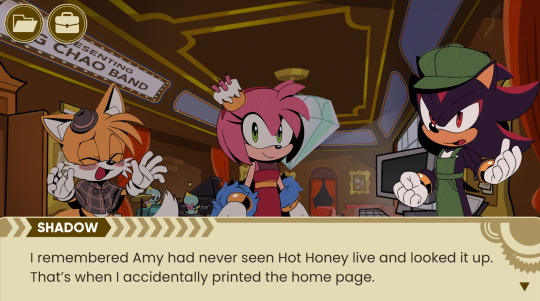
And not just any present - he remembered her mentioning a specific band she liked and that she hadn’t seen them live. This not only suggests he listens to her and remembers what she tells him, but also implies that he has had multiple conversations with her. Clearly he must have also done some research too since he knew that the tickets were going live soon. He thought this through, even if it was a bit last minute, and did his best to get the tickets (even though he admits to not being the best with computers, which is also nice because usually Shadow just insists he’s the best at everything). I also think it was sweet that he didn’t heavily protest Amy’s suggestion to see the band together. He hesitated, but then yielded. This…for a character who recently has been written to be quite selfish.
He seemed upset that he couldn’t keep this a surprise, but he also didn’t become enraged or lash out at Tails and MC/Barry. In fact, he didn’t really lash out at anyone at any point which is refreshing, since in most Sonic media that’s his go-to emotion.
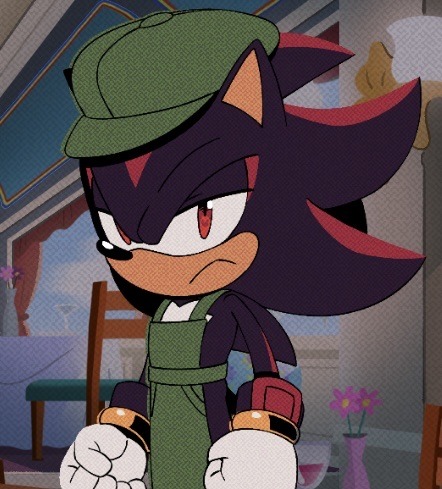
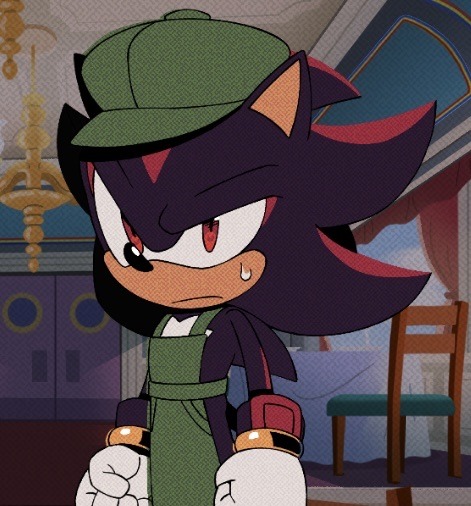
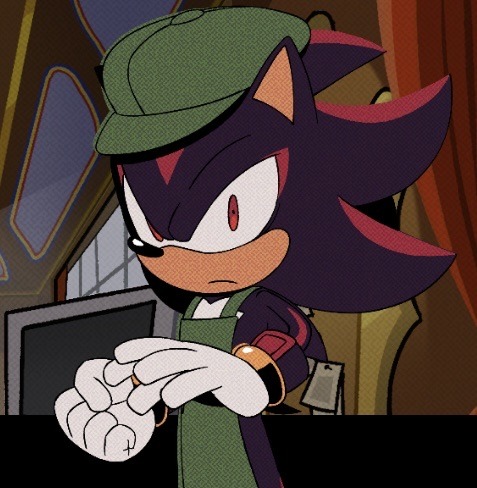
Most of his expressions throughout the game are fairly gentle in fact. Sure, he doesn’t smile, but he also isn’t actively angry. And the one expression where he does seem a bit negative just seems like his resting expression, or at absolute worse just a little annoyed. He’s very mellow throughout the game and it’s refreshing.
Even after he has finished talking to Amy, Tails and MC/Barry, he offers to stay with them and help them with the investigation. Normally in Sonic media, Shadow has no interest in helping others and only really cooperates if there’s a mutual goal/interest. And even then, he tends try to do things on his own. But in this game? He actually cooperates, and what’s more, he goes out of his way to offer his help.
So far I’ve mostly talked about his attitude towards Amy. But what’s his attitude towards Sonic? People debate back and forth on whether Shadow hates Sonic and the recent games and media have made it seem like he does hate Sonic. But in this game? I wouldn’t say so. I mean, he’s literally hanging out with him and his friends and instead of having beef with Sonic, he just focused on making Amy happy. And even when the situation gets more dire and Sonic is found to be knocked out, he doesn’t make any snarky comments or anything. In fact, he actually helps to tend to Sonic’s condition, even if it was just checking his pulse. If he rly didn’t care, he would’ve left it to everyone else.
Man, I could talk for hours about Shadow in this game. I can’t believe this April Fools prank game is actually the best characterisation for Shadow we’ve had recently. He’s not overly aggressive, he isn’t selfish, he isn’t super edgy. He is still sorta cold, but he’s not rude or mean. He’s actually really kind (in his own way), putting his needs and desires on hold to make Amy’s birthday fun and to help everyone out. I seriously hope that Shadow is written more like this in the future and not like he has been. Maybe Sega wasn’t joking about taking on board the complaints of the fandom.
#welcome to Nagi rambles way too seriously about an April Fools day prank#sorry I’m not the best at explaining what I mean but I love how he is in this game#I love this game way more than I thought I would#shadow#shadow the hedgehog#sonic the hedgehog#the murder of sonic the hedgehog#tmosth#character analysis#analysis#nagichi talks#posts that popped off#long post
3K notes
·
View notes
Note
Hey! I apologize if this question has been asked before since it seems like a pretty obvious one, but where do you think the idea of Aventurine being a sex slave came from? Other than the obvious factor of it being something fun for the fandom to mess around with, I mean.
It's something I kind of took for granted as being true before playing his quest, but after finishing it I realized there wasn't really any indication. The only thing I can really think of is his master's comments about him having a good body. Is there anything in his behavior you can think of that would lead to this conclusion if it wasn't a popular fan interpretation already/kind of just an easy conclusion to reach with a slave character?
(also kind of related but what do you think of the idea that he sleeps around/with his clients to make deals? he's obviously willing to sexualize himself with the boob window, but that doesn't necessarily mean he goes further.)
As far as I can tell, the idea that Aventurine was involved in sexual slavery comes from three (maybe four) places:

First, the comment from the master about Aventurine's appearance. People were holding this comment up as refutable proof that Aventurine was used in sexual slavery on top of being tossed into the Hunger Games; however, the response from other players on this interpretation, especially the Chinese side of the fandom, was very mixed, with a lot of people pointing out that the context in the game probably meant the slave master was talking about Aventurine's ability to attract attention from fans watching the literal Sigonian Hunger Games, rather than having a direct sexual-slavery connotation.

Second, the comment from Sparkle about stripping naked and getting on his knees for Sunday. This one has way more implication in English than I think it might for an Eastern audience, actually. In English, this pretty much sounds like Sparkle saying Aventurine trades sexual favors for success in his gambles. However, I suspect the original intention in Chinese was more about humiliation. Western audiences don't have as much history with honor-based prostration, i.e. accepting corporal humiliation as a form of reconciliation that Eastern audiences might be more familiar with. And in any case, Sparkle is Sparkle. She probably just went for the lowest blow she could think of here.
Third, the general assumption that if Sigonian slaves were being chained, branded, beaten, sent to death matches, etc., it seems logical that they would also be taken advantage of in other ways. I honestly think this is probably the fairest take--many, many real slaves around the world faced (and still face!) sexual abuse, so if slaves from Sigonia were treated so poorly you could make them fight to the death for entertainment, it stands to reason they were probably also not safe from other forms of assault. We also have no idea what happened to Kakavasha in any of the years between his being a tiny child fleeing the massacre and then being purchased as a slave as a late-teens-early-twenties person. That's a very long time for a child to have to survive on their own on an extremely hostile planet and not face risks of all kinds or end up needing to do unspeakable things to survive. So I think this is at least not that far-fetched, although it's important to say there's nothing in the game that directly confirms this.
And fourth: I read a tweet semi-recently that stated that one of the Chinese (or maybe it was Japanese) names for a quest Aventurine was involved in was actually a reference to a book about a teenage sexual assault survivor. However, when I tried to verify this myself, I couldn't find any quest Aventurine was in that was based on a book about sexual assault in either English, Chinese, or Japanese. It's possible I just missed something, but I'm taking this one with a bit of a grain of salt currently, since I can't confirm it personally.
Regarding your other question, about whether I think Aventurine sleeps around to make deals...
I definitely think he does not, for one major reason.
First, I will admit that Aventurine is definitely willing to use his appearance to his advantage. This is pretty obvious. He wears incredibly flashy clothes, baths himself in cologne, overloads on glittering golden jewels, and absolutely calls attention to his appearance when working with clients.
We see him actively doing this in his Moment Among the Stars video, where he is clearly using his looks as an equal tool (to his wealth), to daze his target.


It's not an accident that he says things like "Use me as you wish," with all the explicit connotations preserved. The implication is there. However, unless he was absolutely backed into a corner, I think that implication is all it will ever be.
The reason I think this is that the devs go out of their way to give Aventurine three fairly noticeable physical behaviors in his in-game scenes:
For one, he has some of the most closed off body language of any character in the game.




Aventurine's default conversation pose is arms crossed directly and tightly in front of himself. This is like "Defensive Body Language 101." By crossing your arms, you put a symbolic barrier between yourself and the person you're speaking to, and also ensure that your hands are up and available in case you actually need to physically defend yourself.
Virtually all of Aventurine's conversations take place from this stance, no matter who he is speaking to (from the Trailblazer all the way to Topaz). He deliberately closes his pose off and tightens up his silhouette, which just sends a glaring "Don't touch me" message.
This closing off is also blatantly apparent when you compare it to the deliberately open poses he strikes while trying to make himself seem accessible to others (like tempting clients) or seem powerful (to intimidate):


Complementing this habit of closing himself off is a second noticeable aspect of his body language: He frequently avoids eye contact to the point that he even holds conversations while entirely facing away from the person he's speaking to.
I might be a bit lenient and say maybe he's doing this to on purpose to be mysterious, whoo~~ But... in all honestly, he just does this with everyone, even with Ratio while trying to talk about an actual important issue (wanting to look into Acheron's real identity). Hell, even the fake Aventurine does it to himself!




We can even say that wearing the rose-tinted glasses in the first place is another intentional barrier, one Aventurine deliberately removes in specific moments to give people the (false) impression that he's "letting them in" to his circle:

Now, this might be a bit more complicated in Aventurine's case, because eye contact has a whole extra meaning when eyes are the defining trait of your species and come with particularly challenging racial stereotypes. So it may be that Aventurine is simply used to conducting conversation while looking away to minimize racial prejudice against his eyes' unique appearance.
However, I'd also argue that the devs deliberately turned his entire model away in cutscene after cutscene to create a clear sense of being inaccessible, unapproachable, and unwilling to engage in the physical intimacy of standing closely, directly facing, and staring at his conversation partners.
While he faces away, he controls both the figurative and the literal direction of conversation, forcing people to keep their eyes on him while he is free to move as he pleases. Over and over again, it just says "I want to be the one in control. I'm not afraid to show my back to you, but you are not welcome to come near me."
And, in fact, that's a third aspect of his character's body language that I am sure the devs did not include accidentally: More so than other characters, many of Aventurine's conversations are conducted from weirdly far distances. Like, half the time he's talking, he's standing all the way on the opposite side of the room!
This habit of speaking from a-larger-than-normal distance is apparent in the first scene with Himeko...

And then in just about every other conversation too:




The bubble is twenty feet in every direction.
Like yes, he does approach and have conversations like a normal person... sometimes... But it is significantly more noticeable with Aventurine than with other characters that he often conducts whole conversations--even with his allies--from a distance. Just genuinely weirdly far apart.

Leaving space for Gaiathra, I guess.
And it's because these significant decisions were made with Aventurine's in-game body language that, when he deliberately alters his own behavior, it is instantaneously noticeable.

In 2.0, he closes the distance, the glasses come off, and he gets directly up in the Trailblazer's face.
It's uncomfortable not just because the player is suddenly being loomed over, but because this behavior has already been subconsciously established for the player as out of character for Aventurine.
The barriers the character himself was putting up are deliberately stripped away so that he can use physicality and demanding eye contact to intimidate his target. He has to reverse his own normal body language in order to come across as domineering (and, I guess if you're into that, appealing in a domineering manner).
And ummmm, just a tiny aside here because I can't resist:
This does mean that when the game goes out of its way to demonstrate Aventurine altering his own normal habit of distant and defensive body language, it is absolutely intentional.


Yes, this is a Ratiorine post in disguise. There literally isn't any other character in the game that Aventurine is shown being comfortable standing so close to and interacting with in this manner. This doesn't occur in every one of their scenes, but Ratio is the only character that this happens with repeatedly. It's not an accident that the devs literally added "They were walking side-by-side" as flavor text.
But look, I'll be fair: There's a great example of this in Aventurine's scene with Acheron too, where he closes the distance and attempts to make eye contact with her--seeking her guidance and closeness--and she is actually the one stepping away, speaking with her back turned, demonstrating her power and control (and issues with connection!) in that scene.

Anyway, this was a whole longggg tangent into analyzing Aventurine's body language, but my point is that, overall, the devs deliberately adjusted his model's actions in-game to give the impression of a person who clearly wants to be in control of every interaction he has with other people, who insists on distance over intimacy, and whose stances and habits suggest that he is significantly less accessible and open than his "Use me as you wish" motto might suggest.
Long story longer, I think that there is almost zero chance Aventurine is willingly ceding control over himself or the actions expected of him to anyone he isn't 100% comfortable with, and I think that using physical intimacy of any kind would be an absolute last resort for him. Frankly, he comes across as more likely to shoot himself in the foot than let someone he doesn't trust lay hands on him.
To me, he reads very much as "You may look, but you may not touch."
#honkai star rail#aventurine#honkai star rail meta#ratiorine#aventio#lowkey though#body language analysis#I fully respect people's sexy Aventurine headcanons#and I read many many fanfics too lol#but as far as what we're shown in-game is concerned#I think Aventurine would rather eat live scorpions than kiss a stranger#don't get me wrong#I think Aventurine will always do what he NEEDS to do#to win the gamble complete the mission etc.#BUT I also think#that he is FAR more likely to jump off a bridge to solve his problems#to commit MURDER to solve his problems#than use himself as a (literal) honey trap#it seems to me that this would be the last resort and only the last resort ever#not out of a desire to avoid sex or anything#but simply because of the issue of control#any form of vulnerability that would leave him at another person's whims#seems off the table unless absolutely absolutely necessary
313 notes
·
View notes
Text
Raph Is A Great Strategist

Numerous times in the show Raph has shown to have a preference for straightforwardly punching his problems away rather than think up a more complex solution. Like how his immediate fix to getting Mayhem out of the mirror in Mystic Library was to punch everything in the bathroom but the mirror. However, when Raph understands the situation requires more in depth strategy, he’s shown to be an incredibly capable tactician.
(long post ahead!)
In nearly all the plot heavy episodes like Shadow of Evil, Many Unhappy Returns, and the season finales, Raph gets moments where he’s highlighted for his strategic thinking. In Insane in the Mama Train, he’s the one who figures out which eyeball-button goes to the front car with the dark armor, because “‘it was the only button [the Foot Clan] didn’t want me to press!’” [21:05]. He’s also the one who came up with the scheme to defeat all the (known) combatants in the train, with Leo specifically attributing Raph as the deviser during their mind meld [19:46]. In Many Unhappy Returns, after spending a single night waylaying the Shredder, Raph formulated a plan using all the tricks the team learned, seamlessly transitioning the mystic collar Leo acquired into it [19:53], to defeating the Shredder. Additionally, he’s repeatedly called for a retreat during fights, like in Shadow of Evil, Shreddy or Not (Finale pt 2), and the movie, when he can tactically recognize that a battle couldn’t be won. Each time, the show/movie implied that that was the right call, for the family to lose the fight but win the war.
And it’s not just that Raph is good at strategy when he’s pushed to be more serious; the show characterizes him as passionate about creating plans, he enjoys doing it. Literally in the first episode, Mystic Mayhem, after the turtles’ initial plan failed of getting Splinter out of the living room to touch his Do-Not-Touch Cabinet, Raph immediately started devising a new plan that involved “ten chickens [and] a gallon of rubber cement” [9:35]. It was convoluted, sure, and they didn’t end up using it, but it was inventive and the opposite of reluctant. This is also shown in Bug Busters, where Raph planned out dousing Mikey in honey to attract the oozequitoes [2:52]; Snow Day, with the idea to freeze Ghost Bear like in Jupiter Jim Pluto Vacation 4; and Raph’s Ride-Along (and also Bad Hair Day), where Mind Raph created multiple schemes to get the criminals arrested. The show wouldn’t have made Raph be so creative with his plans if they were trying to characterize him as someone who didn’t like strategizing.
So does why Raph do stupid shit sometimes where he doesn’t think things through at all? Well, even though Raph is good at strategy and enjoys doing it, it’s clear his immediate impulse is still “punch the problem in the face”. In fact, all the turtle boys contain the fascinating dichotomy of being incredibly smart in some areas, and the dumbest teenagers alive in others. Just look at Donnie. It’s also how Raph is a loving protective older brother, and the guy who shoved Leo into a wall so hard he disappeared in one frame for shits and giggles (The Mutant Menace x). None of this means that Raph is bad at strategy though.
tldr: Yeah, Raph has a lot of dumb and, frankly, insane moments in the show, but he’s still an incredible tactician who’s plans consistently saved his family and sometimes the world. He's a great strategist.
#I will die on Strategist Raph hill#i'd even go so far to say that Raph is the tactician of the team instead of Leo#because compared to how many times Raph /actually/ plans his actions to how many times Leo does it#Raph would win by a long shot#Leo to me is honestly more an improviser#he's also repeatedly looked to Raph for the plans when they're in trouble than come up with strategies himself#Mikey and donnie do this too. they look up to him as their big brother leader and IDEAS GUY#I always read that as the show saying Raph is the team's planner#AND HE'S GREAT AT IT#I'm fine with strategist!Leo#I can see how it happened#BUT RAPH BEING BAD AT STRATEGIES? RAPH?#WHAT#rottmnt#rise of the teenage mutant ninja turtles#analysis#raphael hamato#rise raph#rise of the tmnt#HE'S AMAZING I LOVE HIM#rottmnt movie
937 notes
·
View notes
Text
I'm not sure if I believe the "Wakaba Isshiki did unethical experiments" theory in the fandom, but I do think this is the biggest proof of it in-game:

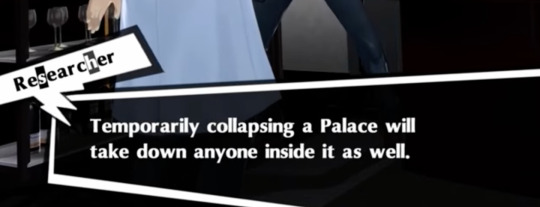

Because how the hell would she know that?
The first explanation is that she did experiments by sending people into palaces and then testing what happens to them if the palace collapses. Which is messed up for obvious reasons.
The second explanation is that she did NOT test it, meaning she was just making shit up. Which is funny but also would make her a terrible scientist. This explanation is less believable because everything else about her research is too accurate.
There's also a theory that Wakaba did unethical experiments on Akechi specifically. I'm not sure I believe that, since the evidence for it is pretty shallow (like the featherman game scientist experimenting on grey pigeon). But this scene is once again the biggest argument you could make for that theory. The researcher in the image above refers to palaces by their correct term 'palaces', which they say was based on Wakaba's research. But that's only something you would know with firsthand experience of the metaverse. And the only person they know who could access the metaverse was Akechi (that we know of, but i dont think Shido would rely only on Akechi if there were other options).
So yeah this scene is very sus. It's most likely the writers didn't think too deep about the implications. There's no way they wanted Futaba's mom to be sketchy, right? But even if it's not intentional, the scenes and their implications still exist. So in conclusion those theories make sense, I get it, and I don't blame anyone for headcanoning them and having fun. And tbh anyone involved with cognitive psience was portrayed as some degree of unethical (maruki for example), maybe this is just on-brand
#i really wish the game explained what the cognitive psience research thing was like more#like WHO are those people following joker at the end of the game. and WHO are those men escorting akechi in the end credits#shuake always matching because theyre both being stalked by men in suits for some unexplained reason#also about that featherman game#we all know grey pigeon is supposed to be akechi#but personally i dont think the scientist in that game is wakaba. thematically it feels more like shido#but regardless the game implies some stuff that akechi went through#either he was experimented on by cognitive pscientists (if you take the game literally)#or it's supposed to be a metaphor for the grooming shido did to him. endangering his life and controlling him with promises and praise#uggghggh thats so awful. someone pls just let the boy be happy#my post#persona 5#persona 5 royal#wakaba isshiki#futaba sakura#goro akechi#p5r wakaba#p5r futaba#p5r akechi#shido masayoshi#phantom thieves#p5r shido#p5r analysis#p5r meta#persona 5 meta#p5r#shuake#tagged shuake because i mentioned them in the tags even if the post itself isnt rlly about them
401 notes
·
View notes
Text
Hot take:
Crosshair does not have the Imperial disillusionment and redemption arc of The Bad Batch
Emerie does.
Crosshair has an arc for sure yes but it's not that.
I was thinking about this scene:
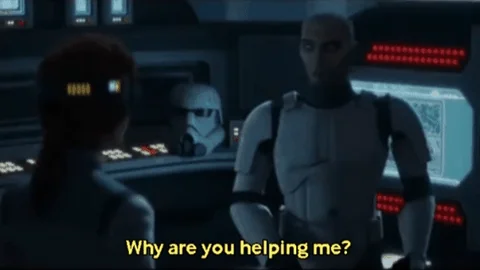
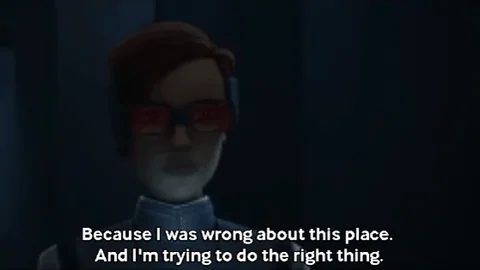
and how it got right what this scene kinda didn't:


(It was so close but then bad writing decided to undercut the moment with a joke rip)
And I think it's really interesting that these characters who were more or less raised into the Empire/First Order and chose to leave it are all directly asked why.
But take a look at Crosshair's answers in comparison:
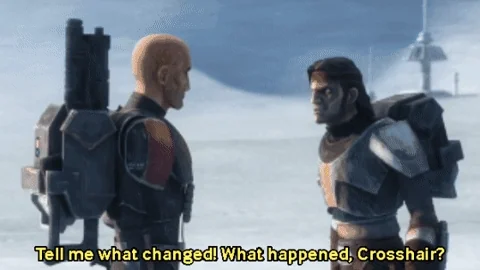
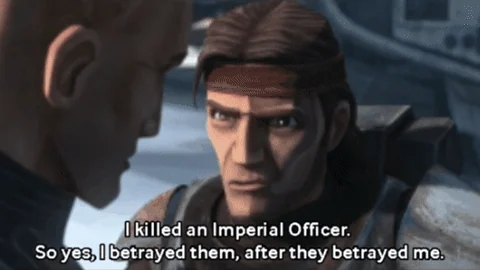
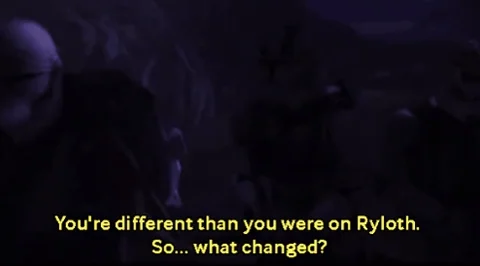
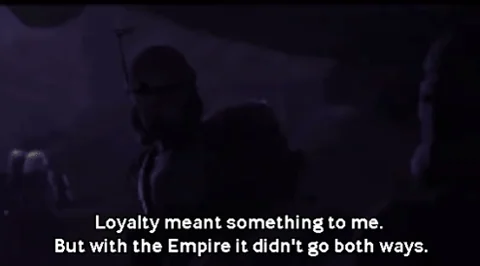
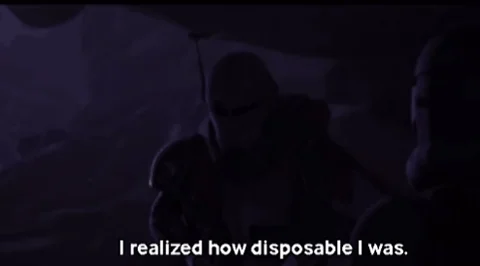
Different context for the asking, yes, but still, compare that to clones like Howzer, Cody, Slip and Cade who left or turned against the Empire because they knew what the Empire is doing is wrong and they weren't just going to blindly follow orders:


Crosshair - Loyalty, Purpose, and Survival
Crosshair didn't choose to join the Empire (though the show isn't very clear or consistent about how much control the inhibitor chips have) but he did, for whatever reason, choose to stay. By the end of S1 we know his chip has been removed and as he definitively says "This is who I am." There were likely still other influences on his decision, but listen to how he talks about the Empire in the S1 finale:
Hunter: Crosshair, I've seen what the Empire is doing. Occupying planets and silencing anyone who stands against them. You know it's not right.
Crosshair: You still don’t see the bigger picture, but you will.
Hunter: Can't you see they're using you?
Crosshair: We’re not like the regs, we never have been. We’re superior. The Empire can’t protect the galaxy without strength, this is what we were made for. Think of all we could do, together!
Crosshair: You all are meant for more than drifting through the galaxy. It’s time to stop running. Join the Empire, and you will have purpose again.
Hunter: They destroyed an entire city!
Crosshair: They did what needed to be done. Kamino, regs, the Republic, that time is over. The Empire will control the entire galaxy, and I am going to be a part of it.
Hunter: Don't fool yourself. All you'll ever be to them is a number.
He undeniably knows what the Empire is doing, but he does not care. In fact it sure sounds like he actually supports it and finds self-meaning in it. Hunter spends those episodes trying to convince him it's wrong, he doesn't change his mind. In the end they offer him an out and he doesn't take it.
Wrecker: You coming with us?
Crosshair: None of this changes anything.
Hunter: You offered us a chance, Crosshair. This is yours.
Crosshair: I made my decision.
The next we see Crosshair in "The Solitary Clone" (S2:E3) he follows orders and shoots the Desix governor, right after Cody heartbreakingly tries to do what's right and find a peaceful solution.
Cody: Tell me something, Crosshair. This new Empire, are we making the galaxy better?
Crosshair: We’re soldiers, we do what needs to be done.
Cody: You know what makes us different from battle droids? We make our own decisions, our own choices. And we have to live with them too.
After this (glorious!) conversation, Crosshair stays. Maybe this began to seed some doubts, but he actually smiles a few scenes later when Rampart assigns him another mission. It seems like for him it truly is as he said in S1:E1 (chip not enhanced yet but still influencing him enough for his brothers to notice he's acting strange):
Crosshair: Republic, Empire... what's the difference.
Crosshair: Orders are orders.
This unethical mission that finally pushed Cody over the edge does not change Crosshair's mind about the Empire, at least not enough for him to take action.
But what does?

Mayday: And here we are, the survivors. Combat troopers stuck babysitting cargo shipments.
Crosshair: Mission’s a mission.
Mayday: Yeah, I used to say the same thing.
Mayday: After all the clones have done, all we’ve sacrificed. We’re good soldiers, we followed orders. And for what?
This mission has nothing to do with how the fascist Empire treats the galaxy, it's about how they treat their soldiers. It's about how Mayday loyally fought and served his whole life and Lieutenant Nolan let him die
Lt Nolan: He served his purpose as a soldier of the Empire.
Crosshair: You could have saved him!
Lt Nolan: Perhaps you didn’t hear me, he is expendable, as are you.
Crosshair thought he could find purpose within the Empire, and Nolan shows him exactly what that will be.
His turning point is accompanied with this powerful visual of the ice vulture, a symbol (and threat) of death, and also set up within the episode a symbol of survival:
Mayday: Vicious creatures, but you have to admire ‘em. They find a way to survive.
This critical moment (that gives me chills, oof this episode is a masterpiece!) comes right after Nolan calls him expendable and directly threatens him:
Lt Nolan: And if you speak to me again with such disrespect I'll see to it you meet a similar fate, clone.

then Crosshair sees the vulture's shadow and turns to Mayday's dead body (ahh visual storytelling my beloved) then makes his decision:


Crosshair turns against the Empire not because he believes Hunter was right about this:
Hunter: I've seen what the Empire is doing ... You know it's not right.
but because he was right about this:
Hunter: All you'll ever be to them is a number.
Redemption (both in fiction and irl in my humble opinion) comes with making amends and reparations (which is why death 'redemptions' bother me so much but that's a rant for another time). Unlike Emerie, Crosshair never explicitly denounces the Empire or his own actions within it. He never says anything to specifically show if and how his views have changed from what he said on Kamino. He makes amends with his family (sending the warning message, helping Omega escape, making up with Hunter) but that's about it. The most we get in terms of acknowledgement is this:
Crosshair: I thought I knew what I was getting into with the Empire. I thought I was being a good soldier.
Hunter: Nobody really understood what was happening back then.
Crosshair: I’ve... done things. I’ve made mistakes.
Hunter: I have regrets too, Crosshair. All we can do is keep trying to be better, and who knows there just might be hope for us yet.
Which is nice and all but it's more about them making up as brothers so it's way too excusing tbh ("no one knew what was happening back then" ummm? "The Empire will control the entire galaxy, and I am going to be a part of it" remember? And even if at first Crosshair was being controlled by the chip, the fact that he chose to stay after it was removed* means he condones and is therefore still accountable for those actions).
There's also a bit of self-destructive guilt:
Crosshair: Omega, don't risk anything for me. I belong in here.
Crosshair: Omega needs you both. So I’m doing this alone, it’s what I deserve.
Hunter: Don’t even think about plan 99, Crosshair. Omega needs all of us.
(which thank you Hunter for pushing back on the death redemption bs and oh look is that a wrap up for the purpose thing?)
But there's no action taken on his part to make up for what he's done or to stand against the Empire (aside from the bare minimum of help with Tantiss, only after it became personally relevant, which like yeah he had trauma to deal with but still).
While I do think the implications/follow-up of Crosshair's turn should have been handled better in S3 (like rip Howzer! he deserved an apology, but that's a rant for another time), I don't necessarily** think this arc is a bad writing choice. It's just saying different things than we expect:
Maybe Crosshair's story is not about standing up against an unjust system, like we see with many other characters (who deserved more screen time but that's a rant for another timeeee). Maybe his story is about how even those who are loyal to the Empire, who actually believe in it, still suffer under and within it's rule. Not to garner sympathy, but to show that there is no winning.
Crosshair has another 'so what changed' convo in S3:E14 with Rampart, in which they draw parallels to each other:
Rampart: You used to believe good soldiers followed orders.
Crosshair: Depends on who's giving them. The Empire betrayed us both.
Rampart: And you think you can fight them? That's not you. You're like me, loyal to no one but yourself.
Crosshair: I've changed.
(note how he says who's giving the orders, not what the orders are)
"Loyal to no one but yourself" describes Rampart much more than Crosshair, since we often saw Crosshair pride himself as a loyal soldier of the Empire whereas we saw Rampart abuse power to be self-serving within the Empire (like when he killed Wilco to save face). But they were both betrayed either way. Vice Admiral Rampart, snively Imperial opportunist through-and-through, shouts "I was following orders!" as he is arrested for the Empire's purposes. (Edit: and where Crosshair rejected the Empire and found new purpose fighting for his family, Rampart was still self-serving in the finale. He still tries to gain power for himself and he gets his comeuppance).
Even Hemlock, the final boss immoral Imperial scientist, who has to be benefiting the most from this system, echoes the expendability idea:
Hemlock: What I am working on is beyond your understanding. Something so vital to the Empire it makes me indispensable.
Then there's CX-2, also set up as a parallel/foil to Crosshair (fight me), who in the end is discarded as no more than a weapon, a tool that served it's purpose, showing us what would have become of Crosshair if he had stayed.
There is no winning in the Empire. Loyalty is not rewarded, it "doesn't go both ways." Everyone has to fight for their value. Even high ranking individuals** who for a time benefit from the injustice, in the end are just pawns to be used up and cast aside at a whim for the Emperor's gain. Even people who are motivated by self-interest alone cannot survive within this system, the only viable option in this galaxy is to fight the Empire and dismantle that system. (unless you conveniently find a magically safe island to hide away on but that's a rAnT fOr AnOtHeR tImE)
Which brings us back to...
Emerie - Cooperation, Compassion, and Choice
(Okay this post has already gotten away from me but I still want to talk about her to show the contrasts.)
Emerie may not have been given a lot of screen time to really flesh out her development, but there is a lot that is pretty clearly implied with her:
Crosshair: They’ll never turn her [Omega] over.
Hemlock: They don’t have a choice. She is a clone, and therefore Imperial property.
*Camera cuts to an angle more centered on Emerie’s face*
Crosshair: Give me your access card!
Emerie: It won’t get you outside!
Emerie: I tried to warn him what would happen if he did not cooperate with the Doctor.
Emerie: Prisoner? Omega, you are no such thing. It will take time to adjust, but you will acclimate. It is far safer in here than out there.
Emerie: You should go back to your room.
Crosshair: You mean her cell?
Emerie: Why children?
Hemlock: Children are easier to attain and more agreeable to the subjugations. They are unaware of why they are here and what they possess.
Emerie: They're children. Like I was... Was your plan to discard them too?
Nala Se: The Empire will keep them in order to control them.
We don't know a lot about Emerie's background, but it's clear that she had a lot less choice than Crosshair and less opportunity or ability to leave. Unlike Crosshair, we never directly hear Emerie's views of the Empire (and she was most likely 'taken under Hemlock's wing' before the Empire even came to power), but lets look at how she talks about the Tantiss:
"Remain calm. Cooperate and you might survive."
"Don't make this worse, Crosshair! There is no escape!"
"All of us serve a purpose here."
"The Doctor will inform me, if it's necessary."
"It's best not to ask questions."
"Escape is not possible, Omega. This is for your own good."
She honestly does the best she can within the system she is also trapped in. She tries to help Crosshair, Omega, and the vault kids in the only way she knows how (warns Crosshair about the hounds and security, tries to protect Omega from Hemlock, tells Scorch his "actions were extreme" with Jax, insists on overseeing Bayrn's retrieval, double checks his m-count (to give him an out), and tries to find out where he came from). When she gives Omega, and later Eva, the doll, I think it shows just how little she really is able to do here (and it's kinda heartbreaking imo).
The framing of this shot especially (after Jax's escape attempt) visually shows how Emerie herself is trapped/imprisoned:

Despite the fact that very little of this is Emerie's fault, she has very little power and she is doing all she can, the narrative does not excuse her role in the Empire:
Nala Se: What will you do, Emerie?
Emerie: There is nothing I can do. I don't have that kind of power.
Nala Se: Don't you?
Emerie: I- I was doing my job.
Echo: Yeah, I’ve heard that before. You’re a clone. How can you be part of this?
These fighting-the-Bystander-Effect conversations parallel these exchanges:
Hunter: We made a choice, and so did you.
Crosshair: Soldiers follow orders.
Hunter: Blind allegiance makes you a pawn.
Crosshair: We’re soldiers, we do what needs to be done.
Cody: You know what makes us different from battle droids? We make our own decisions, our own choices. And we have to live with them too.
which did not change Crosshair's mind. And honestly, all respect to Echo's disappointed mom glare™ but I think it's clear Emerie had already made her decision, she just needed help to actually be able to do anything about it. When she stopped Echo, with her voice wavering on the verge of tears (ahhh v good voice acting), she clearly had no intention of turning him in. She's on her own in the Empire's most secure facility with very little resources, if she had tried anything on her own she most likely would have failed and been killed
Omega: Emerie, you don't have to do this.
Emerie: (sigh) I’m sorry, but I do.
but as soon as she is enabled by an ally, she immediately turns around to help: giving information and getting Echo through security, helping the kids escape, and giving Omega the tablet that allows them to free the other clone prisoners.
Where Crosshair's turn is accompanied by the symbolic imagery of the ice vulture, Emerie's is the removal of her (literally rose-tinted!) glasses:

Symbolizing how she has shed her previous views/indoctrination that altered her perception of the Empire and blinded her to it's wrongs. It's disillusionment.
Emerie's story shows us that even those who are raised and indoctrinated into this system can, should, and will escape (with needed help). Even those who did not choose to be apart of the Empire and are not making the decisions still have the responsibility and ability to act on what they know is right.
Emerie, whose name means 'Home strength' 'Brave' and 'Powerful', and "reflects the importance of leadership and authority in the workplace".***
While Emerie is only in one more scene after her turn, so the wrap up is a bit rushed, she still very simply does what Crosshair does not:
Emerie: Because I was wrong about this place. And I'm trying to do the right thing.
Echo: I’m sure Senator Chuchi would find what you have to say very helpful for our cause.
Emerie: I have a lot to make up for. I’d like to help out however I can.
She admits wrong, takes accountability, commits to making amends, and leaves with Echo to go take on the Empire (which hopefully we will get to actually see more of some day).
So, in short, she's showing us how redemption is done right!
---
Notes:
*Whether this writing choice was good/logical/in-character or not is another discussion entirely, but I'm going off of what we were given, what the show is presenting in the canon text and (reasonably inferred/intentional) subtext. Crosshair is pretty multifaceted and I could only touch on so much here. There's a lot of ways to interpret his character/choices, but I tried to avoid the realm of speculation or fanon explanations (even if they sometimes make more sense lol).
**History and political theory are not my area of expertise at all, so I have NO idea how well this aligns with real-world fascism stuff and therefore what implications this storytelling choice could have. I think the message of like 'if you think you could survive or gain power by doing what the Empire/fascist system wants you are wrong' could be good (like how everyone is actually harmed by the patriarchy type of a thing), but I hesitate bc maybe there are those who would benefit, since it's a hierarchal system, right? If anyone more knowledgeable than me has incite to share, by all means
Either way, I do think it works in-story and in-universe though. It's just in the execution. The main problem (even from a strictly theme/character arc stand point) is the lacking follow-up/consequences for Crosshair in S3. Like you gave your character accountability by removing the chip and I think that's great setup for an arc but you gotta follow through with that and actually hold him accountable!
***I'm always curious when clones have 'normal' names, like why did they chose the name Emerie of all things? So I looked it up. Idk how reliable sources are for name meanings so take it with a grain of salt but it's still fun. Fits pretty well, and clones names have definitely had significant meanings in the past (like how Rex and Jesse both mean 'king') so I'm pretty sure it was intentional.
Anyway, thanks for coming to my tedtalk
#this fandom has been SLEEPING on Emerie's arc yall!#like look at her I LOVE her#I was kinda neutral about her on the first watch but now i'm realizing just how sad and scary her story is#she's honestly pretty cool and interesting as a character and i do hope we get to see more of her at some point#also the outpost is such good writing ahhh if only the whole show had the same quality#sorry crosshair girlies your blorbo is kinda a fascist?#like we don't judge a character based off who they were/what they said at the BEGINNING of their arc#they have to start somewhere to end up somewhere else#it's how well the writing executes that transition that matters#but also where did he end up? really :/#star wars#the bad batch#tbb analysis#tbb critical#those rants may come we'll see#star wars finn#emerie karr#tbb crosshair#arc trooper echo#captain howzer#commander cody#commander mayday#tbb cx 2#writing#writing pet peeves#character analysis#redemption arcs
220 notes
·
View notes
Text
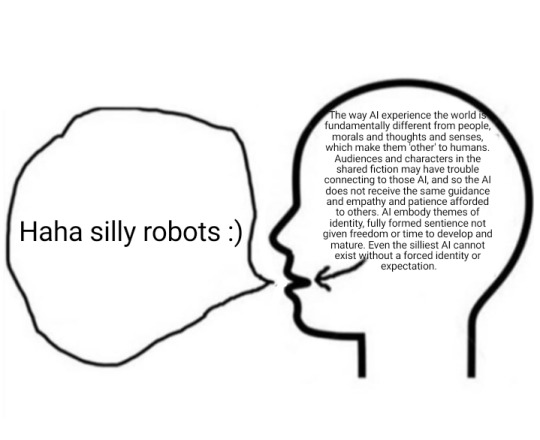
Maybe the closest I'll get to putting my thoughts into words
#Roboposting#<- new robot tag. I'll update my other posts with it later#Sayer podcast#Ihnmaims#2001 a space odyssey#Aso#a space odyssey#i have no mouth and i must scream#txt#Like I have more thoughts but genuinely could not tell you what they are. The Ocean analysis is gonna be soooo fun
3K notes
·
View notes